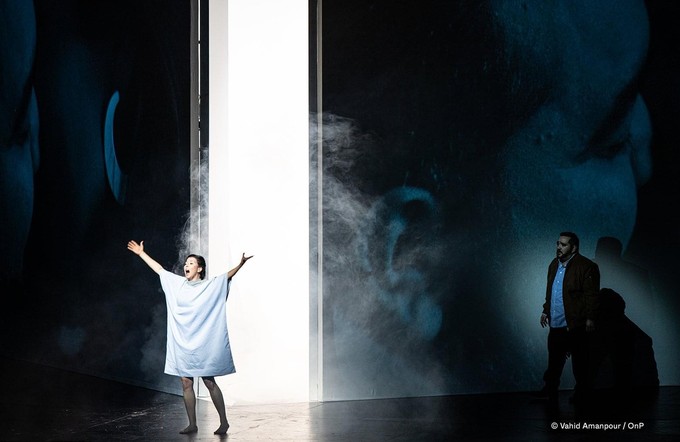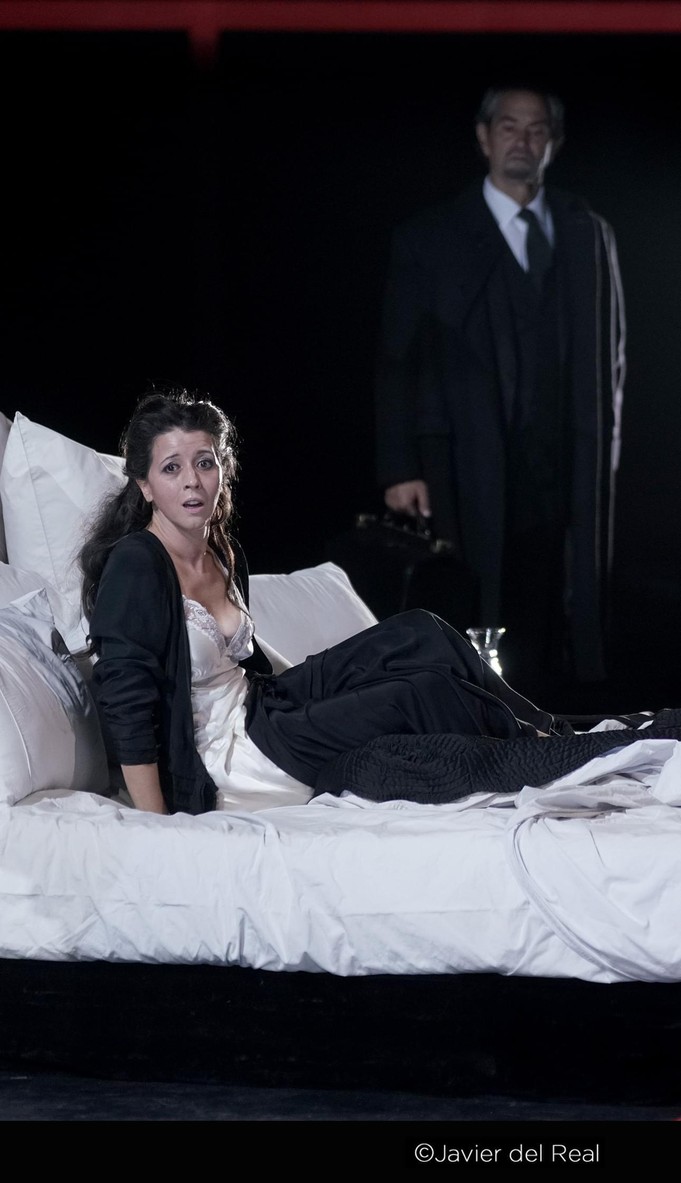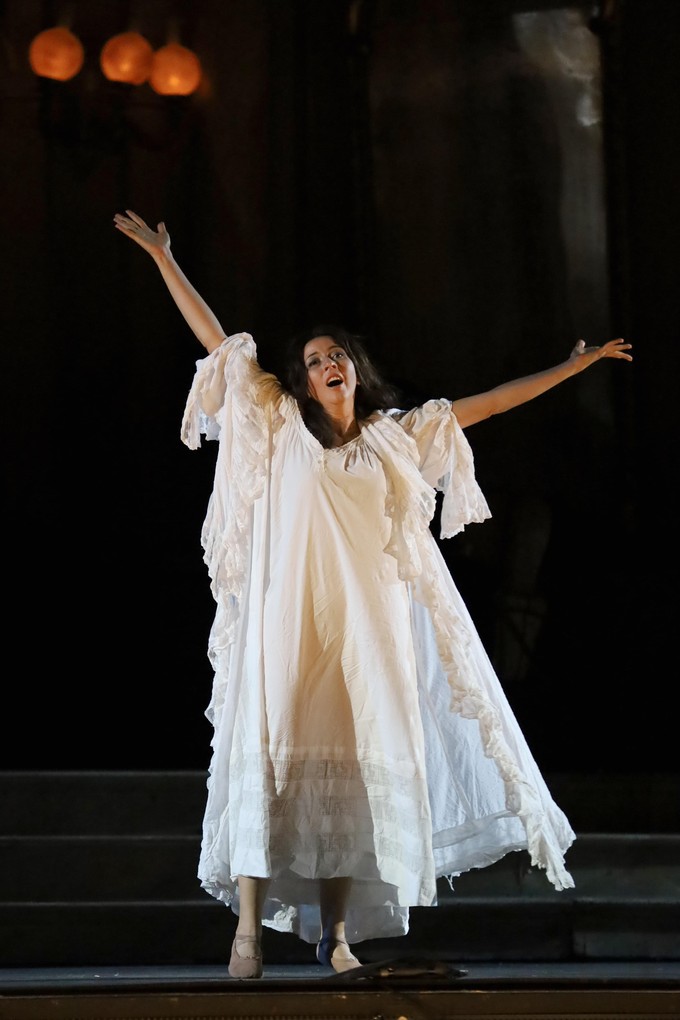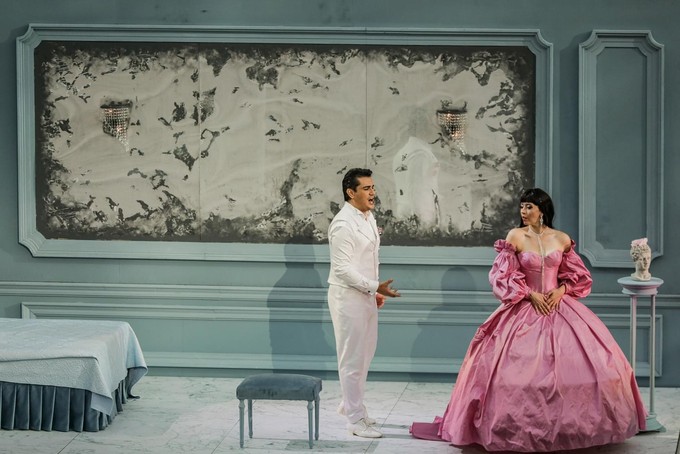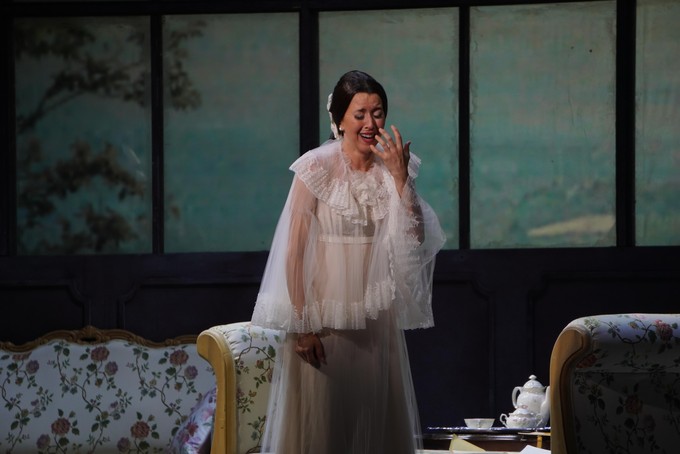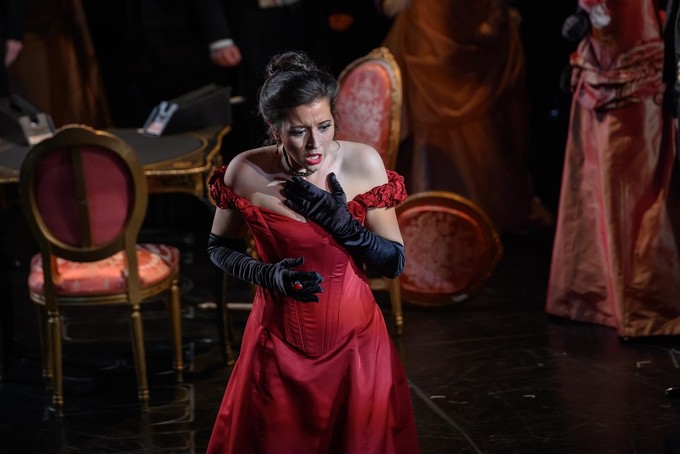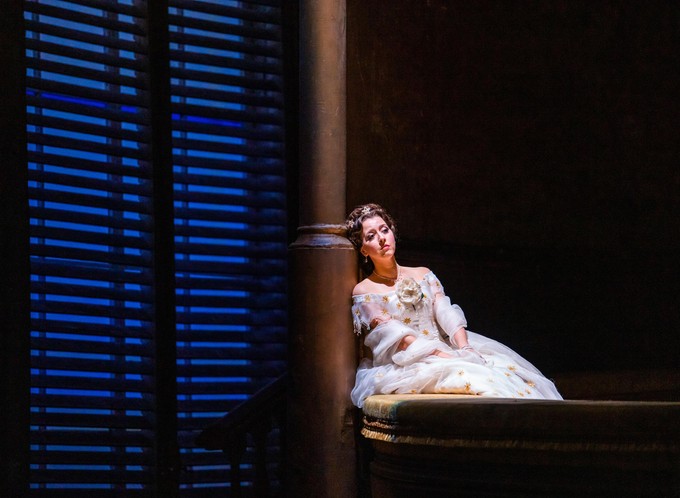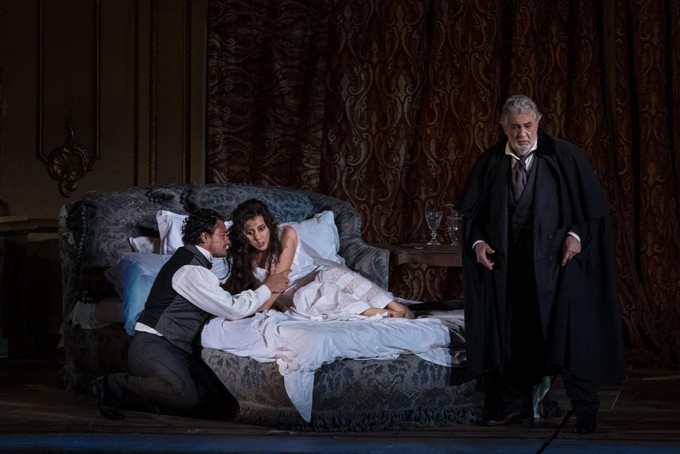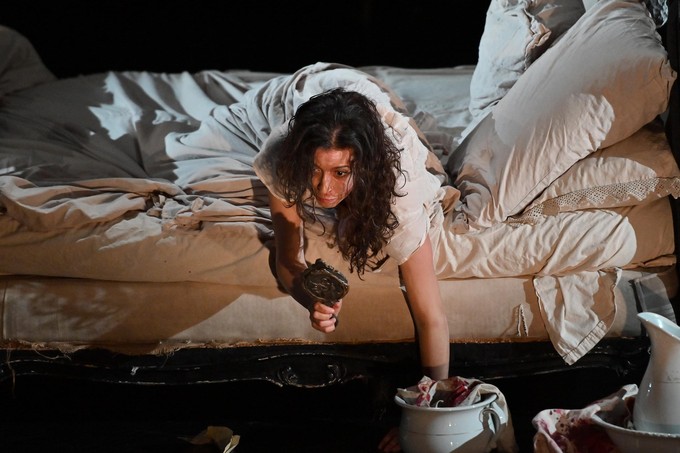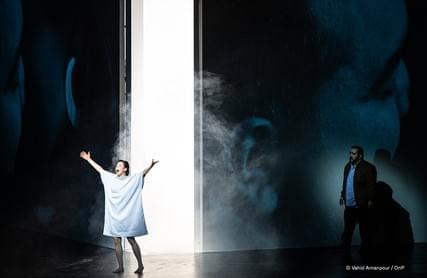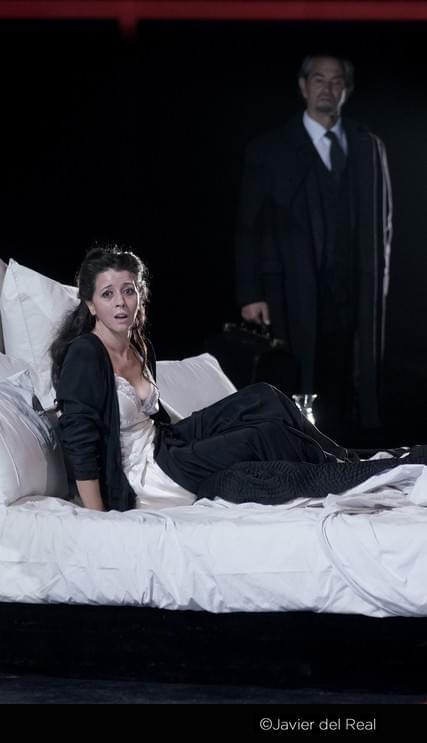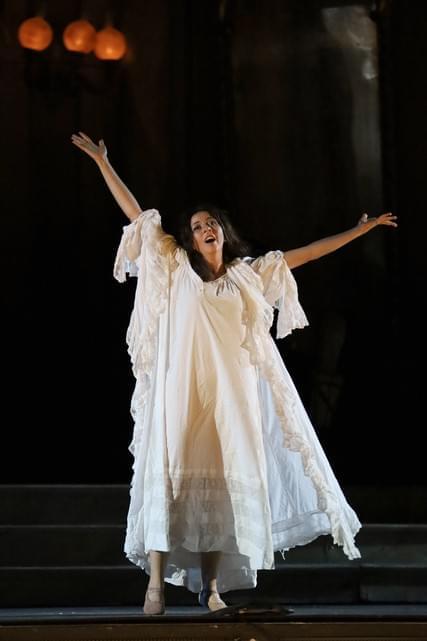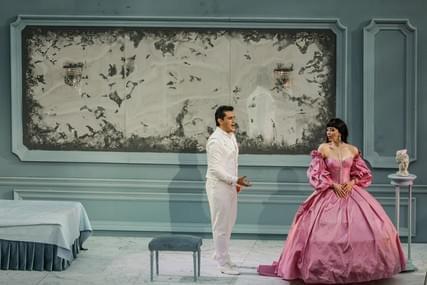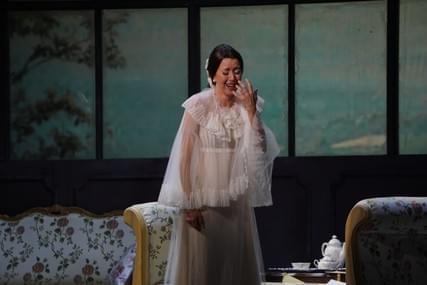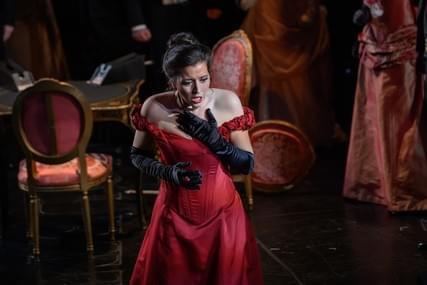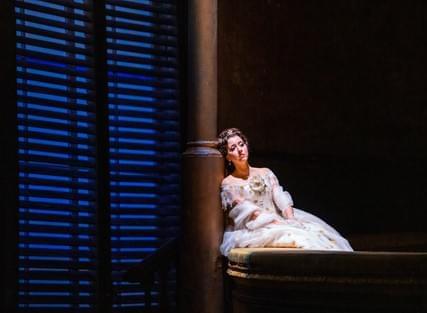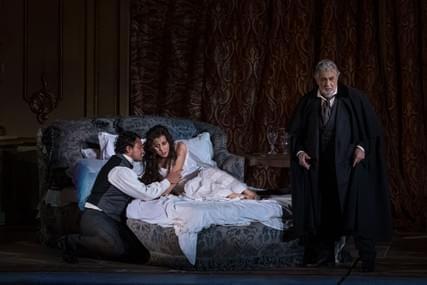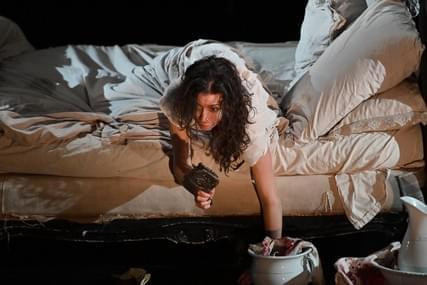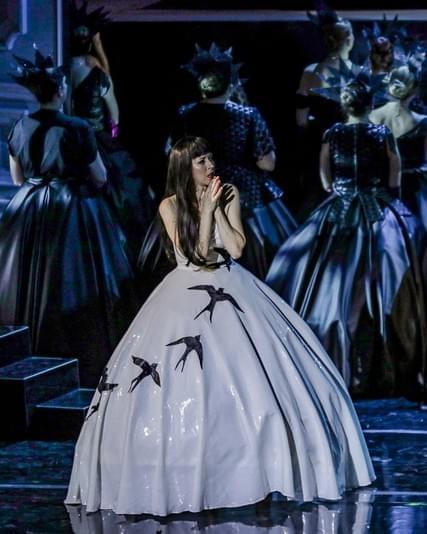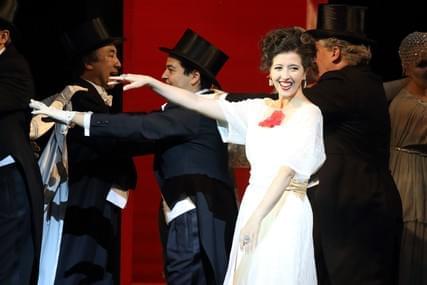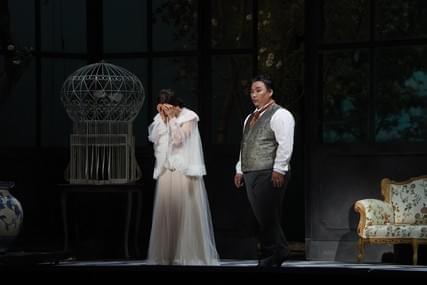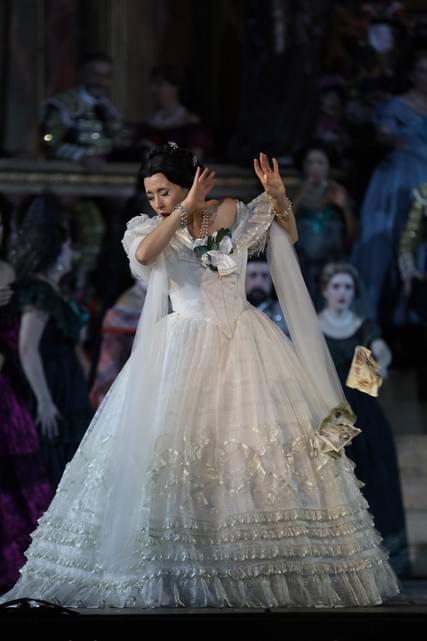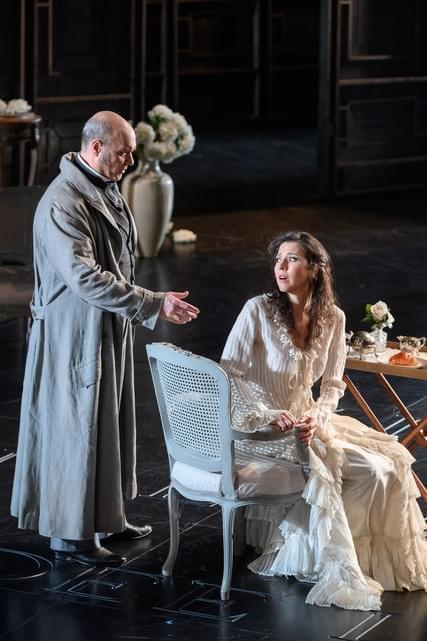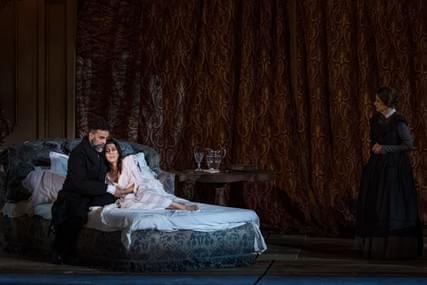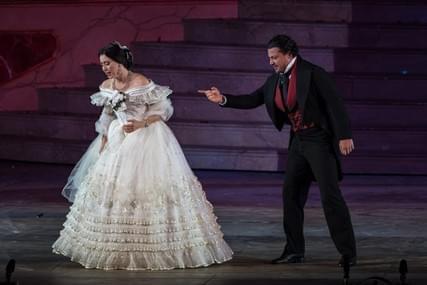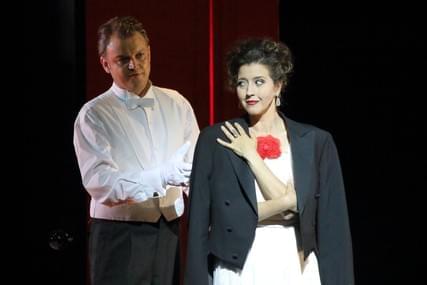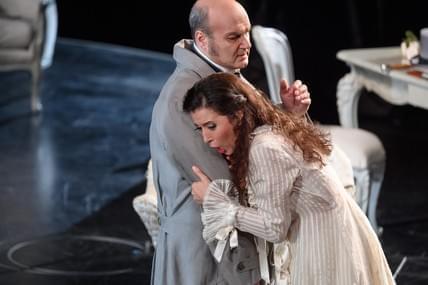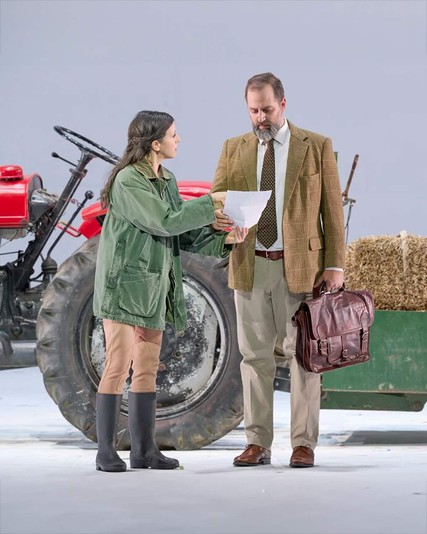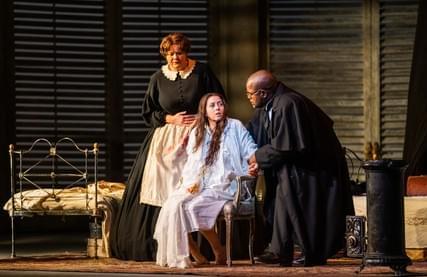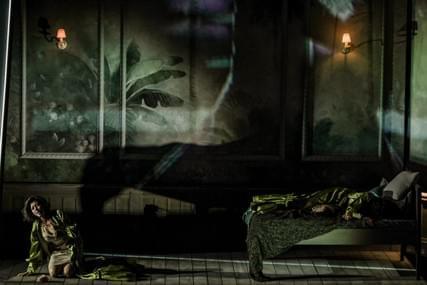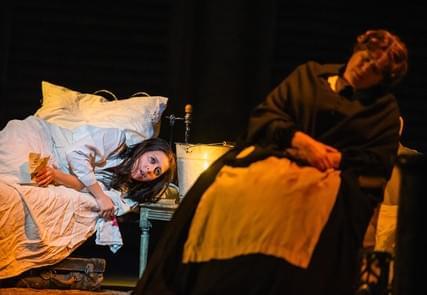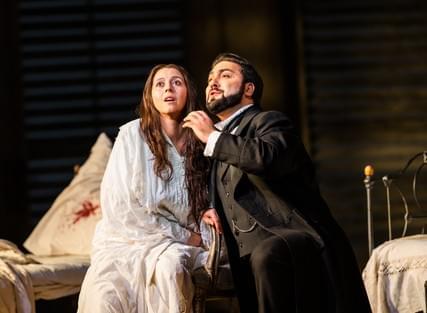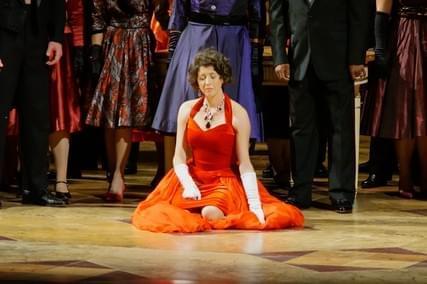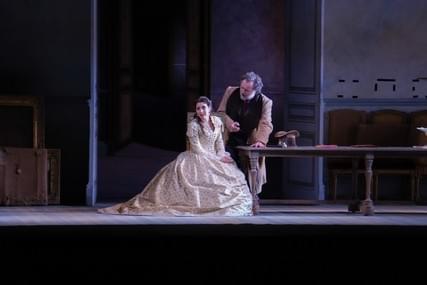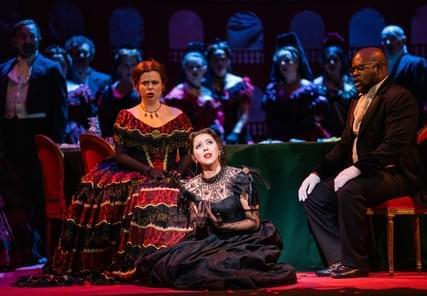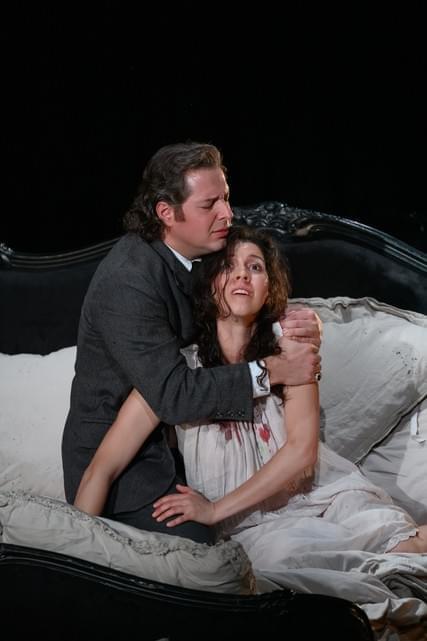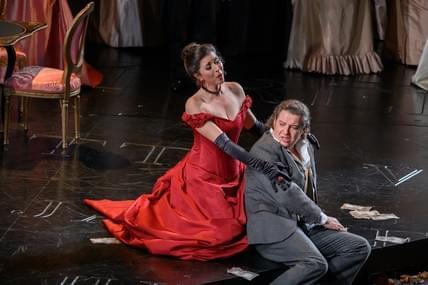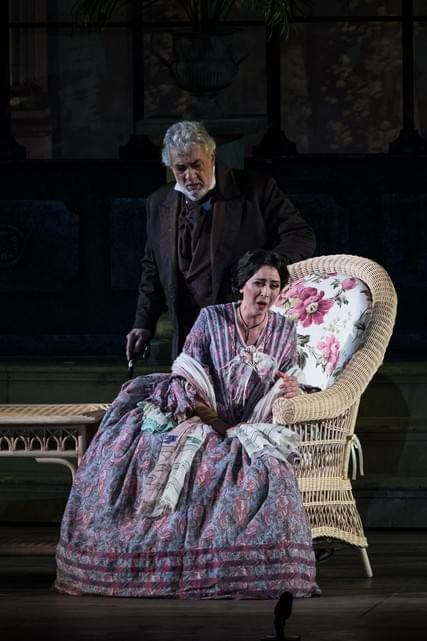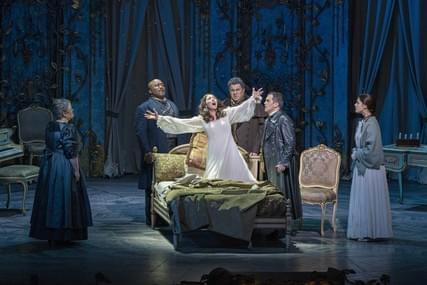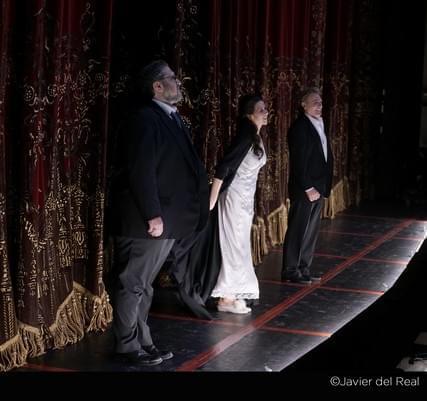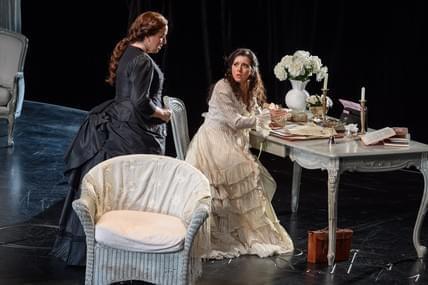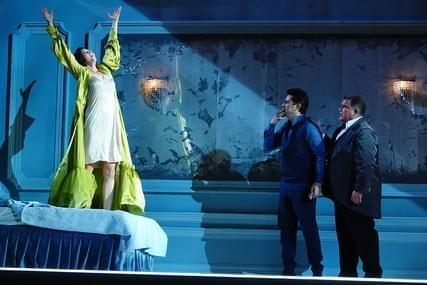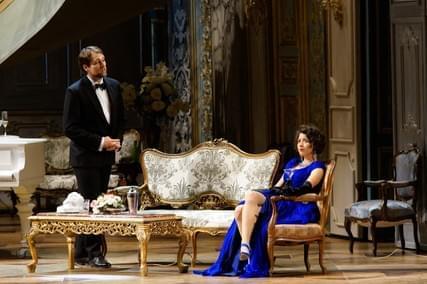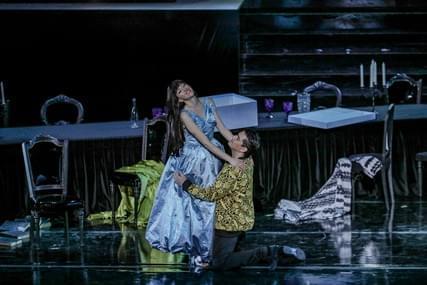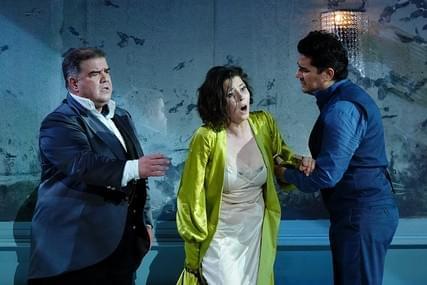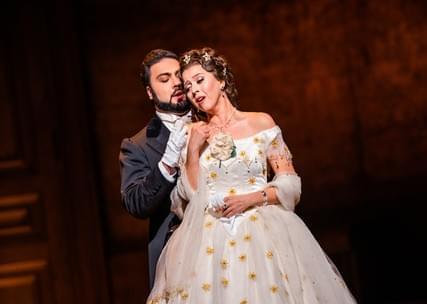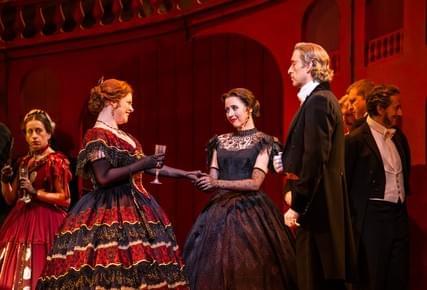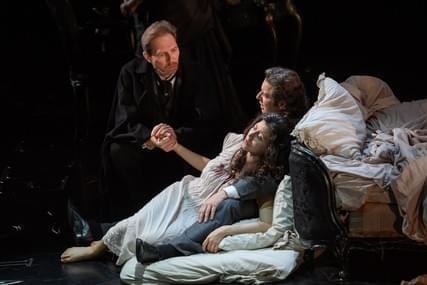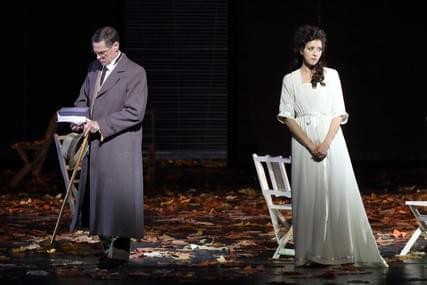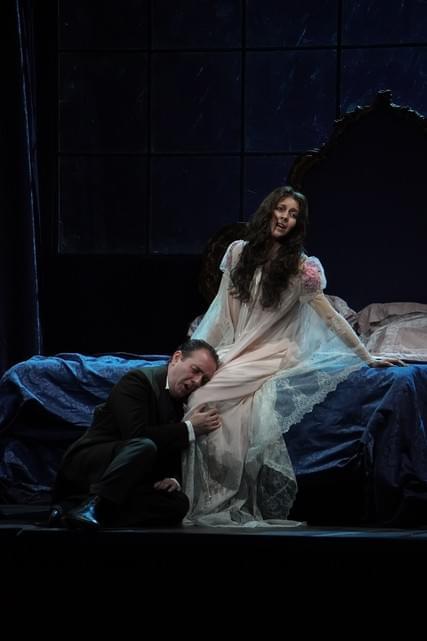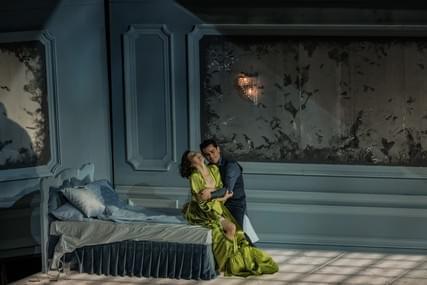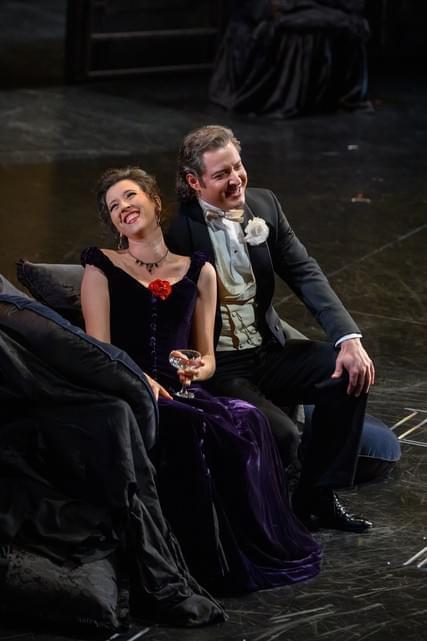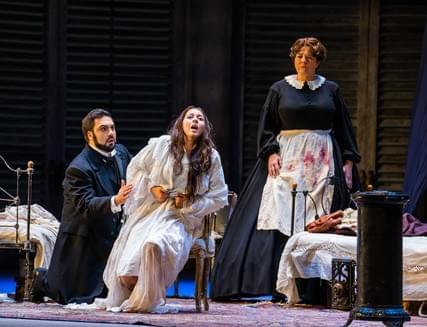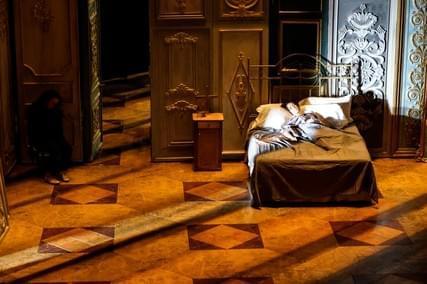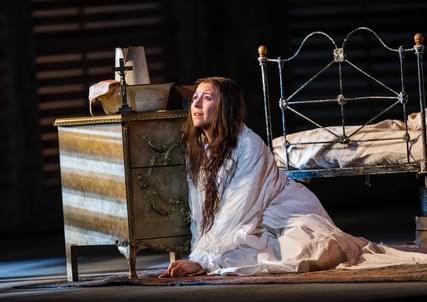Violetta Valery in La traviata
Lisette Oropesa's portrayal of Violetta Valéry has been universally praised across various reviews, highlighting her as an exceptional choice for the role. A common theme in the reviews is her ability to balance the lyrical and dramatic demands of the character with her coloratura soprano voice. Critics consistently note her technical perfection and the shimmering beauty of her voice, which carries both the delicate lyricism and the emotional depth required to bring Violetta to life. Oropesa's performance is described as captivating, with her voice radiating and blossoming, suggesting a deep understanding and mastery of the role.
Another notable aspect of Oropesa's interpretation is her intense and nuanced acting, which brings emotional authenticity to the character. Reviewers emphasize her ability to convey the complex emotions of Violetta, from her confident allure to her vulnerability, particularly in intimate scenes such as her interactions with Alfredo's father and the poignant final act. Her portrayal is said to set new standards for the role, with her dynamic vocal power and expressive acting creating an overwhelmingly moving experience for audiences. This combination of vocal prowess and dramatic interpretation confirms her status as one of the leading sopranos of her time, making her performance a highlight of the production and a memorable experience for opera lovers.
Lisette has been reviewed 69 times in this role.
Role Information
- Composer: Giuseppe Verdi
- Opera: La traviata
- Performances: 51
- Reviews: 69
- Venues: 13
- Organizations: 12
- Years: 2015 - 2025
Violetta is superbly portrayed by soprano Lisette Oropesa, who has given her soul, voice, and body to this film.
Violetta is superbly portrayed by soprano Lisette Oropesa, who has given her soul, voice, and body to this film.
— Il Mattino, April 2021
Starting, of course, with the sublime Lisette Oropesa. Her performance is a masterclass in singing, paired with a unique sense of emotion. Perhaps even more so in the final act, where no one interprets Violetta’s death better than Lisette. She is a one-of-a-kind singer.
Starting, of course, with the sublime Lisette Oropesa. Her performance is a masterclass in singing, paired with a unique sense of emotion. Perhaps even more so in the final act, where no one interprets Violetta’s death better than Lisette. She is a one-of-a-kind singer.
— Opera Diary, November 2025
US singer Lisette Oropesa dazzles in Simon Stone's production at the State Opera. Yet, these fade into the background when a singer like Lisette Oropesa stands on stage as Violetta Valéry: She credibly embodies this modern, young woman who throws chic parties, communicates via text messages, and captivates with her fabulous voice. For she possesses a lyrical coloratura soprano. Explosive…
US singer Lisette Oropesa dazzles in Simon Stone's production at the State Opera. Yet, these fade into the background when a singer like Lisette Oropesa stands on stage as Violetta Valéry: She credibly embodies this modern, young woman who throws chic parties, communicates via text messages, and captivates with her fabulous voice. For she possesses a lyrical coloratura soprano. Explosive outbursts are just as possible for her as breathtaking lyrical passages, delicate, gentle vibrato. At times, the New Orleans-born American reminds one of Ileana Cotrubas. When she wanders through Stone's Paris after the party in the first act, and intones her "Sempre libera," it is of a unique authenticity. With her brilliant technique, she elegantly fluctuates between expression and enchanting soulful singing.
— Kurier, September 2024
The Power of Nature Lizette OropesaAnd it was fortunate for Lizette Oropesa to be called to play a leading role in this vision. A true power of nature. The 35-year-old New Orleans-based soprano from Cuba, the marathon runner with the vigorous body and the overwhelming voice and body strength, has cut the public's breath. So much so that we forgot…
The Power of Nature Lizette Oropesa
And it was fortunate for Lizette Oropesa to be called to play a leading role in this vision. A true power of nature. The 35-year-old New Orleans-based soprano from Cuba, the marathon runner with the vigorous body and the overwhelming voice and body strength, has cut the public's breath. So much so that we forgot the heat and sweat in our necks as we were crammed into the crowded Herodion and held our breath until we burst into applause again and again. Not at all comme il faut according to the codes of the audience at the opera, but the eagerness to express the chills that permeated the bodies listening to her voice was stronger. With a body of fever and a lyric-like stalk, Oropesa moved to the stage, to the black stage party.— IefiMerida, July 2019
It is possible for a lyric singer to be a great Violetta – among recordings, one I treasure is Bidu Sayão from the Met, who imprinted the role with her distinctive prettiness and pathos. It was Sayão I thought of as I heard how easily Oropesa’s voice carried in the large space, and how elegantly she shaped every phrase, always…
It is possible for a lyric singer to be a great Violetta – among recordings, one I treasure is Bidu Sayão from the Met, who imprinted the role with her distinctive prettiness and pathos. It was Sayão I thought of as I heard how easily Oropesa’s voice carried in the large space, and how elegantly she shaped every phrase, always making the words matter. Throughout, there was telling attention to detail, from the little internal trills in “Sempre libera” that hardly any sopranos today bother with, to the gorgeously tapered phrase endings in “Addio, del passato.” And of course, it helps that Oropesa, like Sayão, is ravishing looking – in her 1950s gowns here (see more on that below), she resembled Pier Angeli.
— Reclining Standards, October 2015
I well remember the impact that the soprano Lisette Oropesa caused exactly two years ago with her Lucia di Lammermoor at the Teatro Real, together with the tenor Javier Camarena. For her naturalness, for her magnetism, for her careful technique, for the closeness of her singing ... And all this has once again marked her return to Madrid, embodying a…
I well remember the impact that the soprano Lisette Oropesa caused exactly two years ago with her Lucia di Lammermoor at the Teatro Real, together with the tenor Javier Camarena. For her naturalness, for her magnetism, for her careful technique, for the closeness of her singing ... And all this has once again marked her return to Madrid, embodying a very close Violetta, with whom it is inevitable to empathize. There is a rare mix of control and emotion in Oropesa's song. Naturalness and technique converge in her doing, in a very chosen, almost select way. Oropesa is a singer of palpalbe intelligence, aware of her means, who manages and manages in such a way that they seem to redouble her potential. Its material, with a pleasant natural vibrato and a slightly dark color,with a barely metallic timbre - it sometimes reminds me of Gheorghiu in its beginnings - it manages to flow with distinguished naturalness. His first act was a paragon of virtues, crowning with an E flat that was nothing but the icing on an exhibition of technical resources, despite a slight fatigue in the last section of 'Semper Libera'.
Already in the second act, Oropesa once again exhibited a prodigious ability to manage his means, singing in a low voice the 'Dite alla giovine', putting the hair on end and creating an atmosphere of outstanding theatricality, as had already happened in the first act with a masterful and chilling 'Ah, maybe him'. Her composure and dignity, in dialogue with Germont; her despair later when she met Alfredo again; and finally his heartbreak when he faced death in the third act. All this reflected Oropesa's voice with amazing ease and with palpable truth. There were even moments in which his voice seemed to double its flow, as in that thrown 'Amami Alfredo quant'io t'amo', with the pit at full throttle. As a final,crowning the page with a sharp A that he regulated at will, in 'Or tutto finì!'. In short, and in short, an anthology Violetta.
— Platea Magazine, July 2020
Lisette Oropesa offers a sensual, deeply human Violetta, shaping the role around vulnerability rather than glamour. Her focused soprano moves with ease and refinement, giving the music both agility and a quiet glow.
Lisette Oropesa offers a sensual, deeply human Violetta, shaping the role around vulnerability rather than glamour. Her focused soprano moves with ease and refinement, giving the music both agility and a quiet glow.
— Interclassical, November 2025
Oropesa conceived Violetta Valéry precisely on the solid foundation of bel canto tradition, deploying a singing of rare purity, dizzying perfection, and admirable balance. She has a formidable control of breath, which allows her in the second act an exquisite enunciation of "Dite alla giovine", a moment of rare concentration, in which she renders the theater silent in front of…
Oropesa conceived Violetta Valéry precisely on the solid foundation of bel canto tradition, deploying a singing of rare purity, dizzying perfection, and admirable balance. She has a formidable control of breath, which allows her in the second act an exquisite enunciation of "Dite alla giovine", a moment of rare concentration, in which she renders the theater silent in front of the quality of expression, absorbed, dreamy, achieved thanks to the generous breadth of breath control. And as one could expect from a singer who masters the resources of her instrument so well, the end of the first act is admirable for the clarity and precision of the coloratura.
— Wanderer, August 2020
Lisette Oropesa leaves the audience breathless every time she opens her mouth, and clearly, the audience would have loved an encore for "Sempre libera". The control of high notes and falsettos completes her vocal line control to the point of no longer being surprising. But this role also allows for an appreciation of the soprano's melodious low register. The two…
Lisette Oropesa leaves the audience breathless every time she opens her mouth, and clearly, the audience would have loved an encore for "Sempre libera". The control of high notes and falsettos completes her vocal line control to the point of no longer being surprising. But this role also allows for an appreciation of the soprano's melodious low register. The two roles sung by Oropesa this season at Covent Garden (Violetta and Gilda) have in common a transition over the course of the evening between virtuosic qualities and a vocal concentration with the intensity of the drama, less brilliant but more tragic.
— Olyrix, October 2021
Lisette Oropesa, in the role of the protagonist, showcases an incredible artistic and interpretive growth. When we first heard the soprano in this role, we predicted further development, and now have proof: her Violetta is now complete, from the virtuosity of Act I to the lyricism of Act II, concluding with the dramatic singing of Act III. The artist has…
Lisette Oropesa, in the role of the protagonist, showcases an incredible artistic and interpretive growth. When we first heard the soprano in this role, we predicted further development, and now have proof: her Violetta is now complete, from the virtuosity of Act I to the lyricism of Act II, concluding with the dramatic singing of Act III. The artist has also grown in her acting abilities, superbly handling the stage development of this iconic character.
— Ieri Oggi Domaini Opera, August 2022
In fact, Ms. Oropesa, the dramatic soprano who stars in the staging at the Academy of Music, brings so much gusto, so much soul to her Violetta, that it is sort of a miracle that the entire stage doesn’t blow up at the end of the three-hour show. Yes, she’s that good, and I’ve never seen an Opera Philadelphia audience…
In fact, Ms. Oropesa, the dramatic soprano who stars in the staging at the Academy of Music, brings so much gusto, so much soul to her Violetta, that it is sort of a miracle that the entire stage doesn’t blow up at the end of the three-hour show. Yes, she’s that good, and I’ve never seen an Opera Philadelphia audience react with such fervor to a performer in recent memory.
— PhillyMag, October 2015
Oropesa is a Violetta with everything as her intricate portrayal of the character is just as mesmerising as her superlative singing. The various situations, moods and states of health that Violetta finds herself in mean that the demands placed on the singing and acting are constantly changing, yet Oropesa remains thoroughly convincing from start to finish. In arias such as…
Oropesa is a Violetta with everything as her intricate portrayal of the character is just as mesmerising as her superlative singing. The various situations, moods and states of health that Violetta finds herself in mean that the demands placed on the singing and acting are constantly changing, yet Oropesa remains thoroughly convincing from start to finish. In arias such as ‘Sempre libera degg’io’ the underlying sumptuousness in her sound is complemented by complete mastery of technique and phrasing so that it positively glistens and gleams. On the other hand, in ‘Addio, del passato bei sogni ridenti’, the inherent security in her voice is paradoxically used to convey the most convincing image of frailty. Her acting is also effective as even her arm gestures are in keeping with the wider picture, whether palms are facing outwards so that arms follow the curve of her dress, or hands are coming together as if the emotion she is feeling is so strong she can practically cradle it.
— Opera Online, November 2021
...and the outstanding Oropesa brings psychological depth and emotional expressiveness to her sympathetic character, ranging from–and equally masterful at–the ebullient bel canto and decorative coloratura of Act I to the scaled-down drama and poignancy of Act III.
...and the outstanding Oropesa brings psychological depth and emotional expressiveness to her sympathetic character, ranging from–and equally masterful at–the ebullient bel canto and decorative coloratura of Act I to the scaled-down drama and poignancy of Act III.
— phindie, October 2015
last night, we were to hear Lisette Oropesa, a soprano at the top of her game whose Violetta blew away audiences in Madrid last year as well as at The Met. She did not disappoint. The keystone of her performance was a truly formidable level of technique. Whatever technical aspect you talk about – breathing, placement of vowel sounds, details…
last night, we were to hear Lisette Oropesa, a soprano at the top of her game whose Violetta blew away audiences in Madrid last year as well as at The Met. She did not disappoint.
The keystone of her performance was a truly formidable level of technique. Whatever technical aspect you talk about – breathing, placement of vowel sounds, details of Italian diction, legato, timbre, emphasis of bel canto phrasing or many more – Oropesa had them all under control, with supreme confidence in her ability to make her voice do anything she wanted it to. Technique brings freedom: the freedom to choose the exact interpretation of every phrase and to know that it’s going to come out exactly the way she wants it to. Opera singers are constantly making difficult decisions and Oropesa seemed to make every one in a way that was musically and dramatically felicitous. I’ll give just one example: in “Addio, del passato”, when Violetta bids goodbye to the past from her deathbed, she gasps for breath between phrases. How loud to make the gasp? Too loud and you break the musical flow, maybe sounding contrived. Too soft and you sound too healthy. Oropesa nailed the balance exactly right – as she did in hundreds of other places.
With that musical freedom came an ability to make every word of the role count, whether it’s the glitter of Act 1, the cheerfulness turning to despair of Act 2 scene 1, the impossibility of an exit from her grief at the card playing scene or the inevitability of her terminal illness of Act 3. Her performance convinced at every point even as we enjoyed the music.
— Bachtrack, October 2021
Then there's Lisette Oropesa. We have been following this dazzling singer for a very long time, and once again, she captivates with her technical ease and the brilliance of a voice of brazen freshness without any flaws. We had already admired her much more traditional Violetta in Verona. In this production, and with this direction, she meets the expectations by…
Then there's Lisette Oropesa. We have been following this dazzling singer for a very long time, and once again, she captivates with her technical ease and the brilliance of a voice of brazen freshness without any flaws. We had already admired her much more traditional Violetta in Verona. In this production, and with this direction, she meets the expectations by adjusting her singing style to the vision of the character. Her singing enlightens the entire performance: the first act, frantic and breathless; the second, one of despair, including musically as Gatti refuses to indulge in insistent lyricism but rather focuses on the "precipitation" (in the chemical sense) of the drama: she is overwhelmed, almost prevented from singing "as expected," and this is also heart-wrenching. The most desperate songs are the most beautiful ones... Her third act is absolutely exemplary in her role as a young woman ravaged by life, her voice has a tragic freshness, and thus almost pointless—for from this crystalline voice, only death and despair will emerge. She also knows how to adapt to a new approach, less demonstrative and more "experienced," more realistic than usual.
— Wanderer, April 2021
Just last week, Lisette Oropesa made her role debut as Violetta at the Haus am Ring - and she proves herself to be an excellent choice. Not only does she possess a voice of expansive volume, agile coloratura, and brilliant highs, but she also fully invests herself in the role: With natural credibility, she navigates the emotional peaks and valleys…
Just last week, Lisette Oropesa made her role debut as Violetta at the Haus am Ring - and she proves herself to be an excellent choice. Not only does she possess a voice of expansive volume, agile coloratura, and brilliant highs, but she also fully invests herself in the role: With natural credibility, she navigates the emotional peaks and valleys between exuberant joie de vivre in the excellently sung "Sempre libera," and depressive resignation, her growing despair etched on her face as the story tragically progresses. With poignant intensity, she pours out her suffering heart, before leaving the world behind through visually hauntingly fading memories of happier days past.
— Klassik Magazin, October 2023
Given that there are six sopranos scheduled to sing Violetta this run, that will be of paramount importance. Having caused a sensation with her superbly sung Gilda (Rigoletto), which opened the season, Lisette Oropesa returned to perform Violetta for the first time at Covent Garden, and rightly brought the house down. Most of the world’s most illustrious sopranos have graced…
Given that there are six sopranos scheduled to sing Violetta this run, that will be of paramount importance. Having caused a sensation with her superbly sung Gilda (Rigoletto), which opened the season, Lisette Oropesa returned to perform Violetta for the first time at Covent Garden, and rightly brought the house down. Most of the world’s most illustrious sopranos have graced this staging over the years, but you’d have to go back a long way to find one with such prodigious talents as Oropesa, who embodies the role so fully.
With a rock-solid technique, she sounded completely at ease across every facet of the role – thrilling coloratura in ‘Sempre Libera’, dispatched with pinpoint accuracy and perfectly tuned runs, wonderfully spun lines, perfect breath control – and acted the role as if her life depended on it. Deeply moving in her Act II ‘Dite alla giovine’, heart breaking in the final act’s ‘Addio del passato’, she capped her thrilling interpretation with an emotionally shattering ‘Parigi, o cara, noi lasceremo’, alongside her former lover, Alfredo, which left few, if any, dry eyes in the house. Without a doubt she is one of the finest, most complete Violettas to grace this staging in its almost 30 year history.
— Music OMH, November 2021
Lisette Oropesa, an American of Cuban origin, is the embodiment of Violetta. With her magnificent voice, she fully embraces the character, freely moving and dancing. Her Violetta is desperate, carnal, and larger than life. The lover to whom she dedicates that "love me, Alfredo," moves listeners to tears.
Lisette Oropesa, an American of Cuban origin, is the embodiment of Violetta. With her magnificent voice, she fully embraces the character, freely moving and dancing. Her Violetta is desperate, carnal, and larger than life. The lover to whom she dedicates that "love me, Alfredo," moves listeners to tears.
— Messaggero Veneto, April 2021
Lisette Oropesa performed the role of Violetta with virtuosity, yet also with profound emotion. Her uniquely dark-hued, resonant, metallic, yet still round and soft voice is something special, captivating the audience throughout the entire evening. She also delivered a convincing acting performance, most notably in the third act, where she deeply moved the audience with her heartfelt portrayal of the…
Lisette Oropesa performed the role of Violetta with virtuosity, yet also with profound emotion. Her uniquely dark-hued, resonant, metallic, yet still round and soft voice is something special, captivating the audience throughout the entire evening. She also delivered a convincing acting performance, most notably in the third act, where she deeply moved the audience with her heartfelt portrayal of the character.
— Online Merker, July 2022
Born to the romantic bell-cadet, the 36-year-old lyricist demonstrated her great class: her medium-sized, well-placed, luminous voice - obviously more suited to her more moving last two acts than to her crafty requirements - her huge Roman amphitheater, her aesthetic and the good taste of her song (trillions, ornamentations) constantly reminded the early Verdi's Bell-Candid debts, the stage presence was ethereal, emotional…
Born to the romantic bell-cadet, the 36-year-old lyricist demonstrated her great class: her medium-sized, well-placed, luminous voice - obviously more suited to her more moving last two acts than to her crafty requirements - her huge Roman amphitheater, her aesthetic and the good taste of her song (trillions, ornamentations) constantly reminded the early Verdi's Bell-Candid debts, the stage presence was ethereal, emotional and emotional j with correct passion doses. Athens was lucky enough to enjoy - and rightly so! - a singer who has all the backgrounds (youth, beauty, voice, stage displacement) to shine worldwide in the role of tragic partner!
— Athinorama, July 2019
It is not at all easy to describe her voice and artistry with words. When such interpretive heights are reached, any review seems clumsy. Lisette Oropesa possesses a truly exceptional instrument. Timbral beauty, harmonic richness, velvety roundness, generous breath support, great range and volume, impeccable placement, and magnificent projection are some of the factors contributing to the extremely high quality…
It is not at all easy to describe her voice and artistry with words. When such interpretive heights are reached, any review seems clumsy. Lisette Oropesa possesses a truly exceptional instrument. Timbral beauty, harmonic richness, velvety roundness, generous breath support, great range and volume, impeccable placement, and magnificent projection are some of the factors contributing to the extremely high quality of her voice. But these aspects alone are not enough to explain the effect it has on the listener. There is something more, something indefinable, that gives certain voices an irresistible power of seduction.
— Mundo Classico, July 2022
Bob Crowley’s sets, famously marked by heavily architectural semi-circular structures choked with objects that get in the way (banquettes, a gambling table, hoop skirts), never seemed to pin Oropesa to the spot as it did with other performers. In Act I she vibrated with life and young innocence, hitting the coloratura heights in the climactic Sempre libera without the brilliance…
Bob Crowley’s sets, famously marked by heavily architectural semi-circular structures choked with objects that get in the way (banquettes, a gambling table, hoop skirts), never seemed to pin Oropesa to the spot as it did with other performers. In Act I she vibrated with life and young innocence, hitting the coloratura heights in the climactic Sempre libera without the brilliance ever seeming forced. The open warmth of her tone, lack of affectation and gentle half-voice allowed her to easily display unfettered hurt and vulnerability, much needed as the libretto carved from the Alexandre Dumas play La Dame aux camélias presses on.
— The Times, October 2021
Lisette Oropesa possesses the ideal physique and fits perfectly into her role as Violetta; her vocal technique is immaculate, and if one can detect any slight hesitation in her performance, it is due to the continuous repetitions or interruptions imposed by the filming process, which hinders the maintenance of necessary concentration. Essentially, she is a lyric coloratura soprano who, nevertheless,…
Lisette Oropesa possesses the ideal physique and fits perfectly into her role as Violetta; her vocal technique is immaculate, and if one can detect any slight hesitation in her performance, it is due to the continuous repetitions or interruptions imposed by the filming process, which hinders the maintenance of necessary concentration. Essentially, she is a lyric coloratura soprano who, nevertheless, manages to face the most dramatic moments with an interpretation based more on subtle psychological nuances than on grand dramatic effects.
— Opera Actual, April 2021
This results in a complete portrait of the character evolution of Violetta, certainly one of the most effective in the long history of this production. In the first act, Oropesa demonstrates beautiful technical mastery of her instrument with good breath control and effortlessly unfurls the embellishments of "Un dì felice, eterna," as well as the agility of the cabaletta "Sempre…
This results in a complete portrait of the character evolution of Violetta, certainly one of the most effective in the long history of this production. In the first act, Oropesa demonstrates beautiful technical mastery of her instrument with good breath control and effortlessly unfurls the embellishments of "Un dì felice, eterna," as well as the agility of the cabaletta "Sempre libera" where she hits the high E-flat, while in "Follie! Follie! Delirio vano," Oropesa conveys the frenzy and latent turmoil stirring in the character. Having left the technical difficulties of the first act behind, the voice begins to acquire greater color and interpretive depth. After the confrontation with Germont, Oropesa makes her entrance in "Ah, dite alla giovine" with a long and sustained mezza voce in a delicate legato (one of the most beautiful musical moments of the evening), which is then opposed by the despair of "Morrò! Morrò!" emphasized by a fist pounding on the table.
— Conessi all'Opera, November 2021
Lisette Oropesa as Violeta Valéry sets new standards for Simon Stone's La Traviata Oropesa's rather lyrical than dramatic soprano impresses with shimmering beauty, is technically perfect, allowing for effortless legato and precise heavenly coloratura, even in the highest register. The airy light timbre and her delicate vibrato give her voice a pulsating, compelling sound. She wonderfully shapes the "Sempre libera"…
Lisette Oropesa as Violeta Valéry sets new standards for Simon Stone's La Traviata Oropesa's rather lyrical than dramatic soprano impresses with shimmering beauty, is technically perfect, allowing for effortless legato and precise heavenly coloratura, even in the highest register. The airy light timbre and her delicate vibrato give her voice a pulsating, compelling sound. She wonderfully shapes the "Sempre libera" and the trills in "Ah, fors' è lui" in the third act. Wistful yet also joyful. In portraying the role, Oropesa benefits from her unerring sense of characters. In the first act, her Violetta appears somewhat artificial, narcissistic, and capricious. The discovery of true love with Alfredo transforms her into a responsible, loving, caring woman in the second act, also aided by the conversation with Alfredo's father. In the third act, she is heavily marked by the deadly illness, oscillating between total despair and burgeoning joie de vivre, which is also evident in her voice. It requires courage. Oropesa's portrayal of the death scene couldn't be more moving, even though the continuous progression imposed on her by the direction on the rotating stage starkly contradicts her miserable physical condition. However, when Traviata then disappears into the brightly shining gap, it is a striking and incomparable exit.
— Online Merker, October 2023
Now, in the final stretch, Lisette Oropesa arrives. You have to go see it, and especially to listen to it. Even if it is only for the few seconds in which her Amami Alfredo transports us to the great ones that we all have engraved in our brain, which is the best hard drive that can exist. It is true…
Now, in the final stretch, Lisette Oropesa arrives.You have to go see it, and especially to listen to it.Even if it is only for the few seconds in which her Amami Alfredo transports us to the great ones that we all have engraved in our brain, which is the best hard drive that can exist.
It is true that we are in need of beautiful things.And it is no less true that the Oropesa gives us the ear.When we still remember his Lucia from two years ago (and his Gilda del Rigoletto from 2015), now comes his Violetta, which enshrines her in the Real: from chaste diva, chaste goddess, to absolute diva.But with the closeness that the divas of the 21st century require.Her elegance on stage, in addition, adds many points.
El Real, we insist, is at fifty percent capacity for health reasons.Those who were on July 18 filled all the gaps with applause;a welcome that makes history.The shadow of the encore flew over the room after his sublime Addio del passato of the final act.Just as the illusion that he would come out to be applauded behind the curtain that closed the first one also flew overhead.As before, as could be done when the voice prevailed.
— Shangay, July 2020
It is finally possible to experience Lisette Oropesa as Violetta in Vienna. Oropesa transforms the feared coloraturas of "È strano" with her radiant, blooming soprano into exuberant expression, just as she moves to tears with "Addio del passato" through a blend of final longing and tender despair.
It is finally possible to experience Lisette Oropesa as Violetta in Vienna. Oropesa transforms the feared coloraturas of "È strano" with her radiant, blooming soprano into exuberant expression, just as she moves to tears with "Addio del passato" through a blend of final longing and tender despair.
— Kronen Zeitung, October 2023
In Act 2, Oropesa found a little more colour and warmth, making us feel, through her command of the legato line and her sensitivity to the text, her very human struggle to deny mortality and fate. She paced the tension brilliantly, revealing the anguish of love relinquished and a heart broken. Perhaps she cannot rely on an innate lyrical quality…
In Act 2, Oropesa found a little more colour and warmth, making us feel, through her command of the legato line and her sensitivity to the text, her very human struggle to deny mortality and fate. She paced the tension brilliantly, revealing the anguish of love relinquished and a heart broken. Perhaps she cannot rely on an innate lyrical quality to convey Violetta’s passion and despair, but Oropesa is a natural singing-actress, and the pathos of Act 3 was heart-wrenching. The expressive details were emphasised but not exaggerated, even if she looked as hollowed out and haunted as a phantom. Indeed, this fragile Violetta was so evidently close to death that it was painful to endure her memories and her prayer, even as it was beautiful to hear them. In ‘Addio del passato’, despite the stunning soaring lines, somehow Oropesa seemed to intimate a body on the cusp of breathless collapse. Even the depiction of the momentary, delusory belief in recovery, known as spes phthisica, was more convincing than I remembered from previous performances, the surge of adrenaline sending the languishing Violetta spinning around the room, only to slump, lifeless, into Alfredo’s well-timed embrace.
— Opera Today, October 2021
With Lisette Oropesa's Violetta - exquisite for her elegance in singing, precision in virtuosity, expressive sensitivity, particularly touching in the final act.
With Lisette Oropesa's Violetta - exquisite for her elegance in singing, precision in virtuosity, expressive sensitivity, particularly touching in the final act.
— DelTeatro, August 2019
Especially when the "Traviata" of our times takes the stage: Lisette Oropesa, with her splendidly radiant coloratura soprano and her intense acting, is simply overwhelming, between the joys of coloratura and the tear-inducing sighing and dying.
Especially when the "Traviata" of our times takes the stage: Lisette Oropesa, with her splendidly radiant coloratura soprano and her intense acting, is simply overwhelming, between the joys of coloratura and the tear-inducing sighing and dying.
— Kronen Zeitung, September 2024
Oropesa shows total command of her vocal instrument, thrilling with her expansive dynamic and expressive range. Dramatically, she is at her best in the heart-rending final act, as Violetta in the final stages of consumption, clinging to the hope of a final meeting with her beloved Alfredo (Liparit Avetisyan).
Oropesa shows total command of her vocal instrument, thrilling with her expansive dynamic and expressive range. Dramatically, she is at her best in the heart-rending final act, as Violetta in the final stages of consumption, clinging to the hope of a final meeting with her beloved Alfredo (Liparit Avetisyan).
— The Stage, October 2021
Foremost among them is the captivatingly singing and emotionally engaging Lisette Oropesa in the title role. The Cuban-American soprano possesses everything essential for this role: a beautiful voice, just large enough, bright and finely timbred, expressive and technically skilled enough to gracefully and almost weightlessly float through the cadenzas with elegant ease. She is capable of the most delicate pianissimo,…
Foremost among them is the captivatingly singing and emotionally engaging Lisette Oropesa in the title role. The Cuban-American soprano possesses everything essential for this role: a beautiful voice, just large enough, bright and finely timbred, expressive and technically skilled enough to gracefully and almost weightlessly float through the cadenzas with elegant ease. She is capable of the most delicate pianissimo, but also solid in powerful sequences like in "Sempre libera." Admirable is how Oropesa can transform herself in the changing emotional worlds, from the blissful joy of being in love in the first act to the heartbreaking despair in "Addio del passato" and the final flicker of life and will to love in the face of death. In her portrayal, she convinces with honest, lovable sincerity, not with grand gestures.
— Online Merker, September 2024
Violetta is superbly portrayed by soprano Lisette Oropesa, who has given soul, voice, and body to this film.
Violetta is superbly portrayed by soprano Lisette Oropesa, who has given soul, voice, and body to this film.
— https://www.repubblica.it/, April 2021
But Violetta Valéry, on this Sunday afternoon, is none other than Lisette Oropesa, triumphant in her melodious power while perfectly embodying the confident seductress. Her performance and dynamic voice broaden the stage and acoustic space, skillfully piercing the wall of orchestra and choirs with her accents, without neglecting the great moments of tenderness and the clear declamation of the text.
But Violetta Valéry, on this Sunday afternoon, is none other than Lisette Oropesa, triumphant in her melodious power while perfectly embodying the confident seductress. Her performance and dynamic voice broaden the stage and acoustic space, skillfully piercing the wall of orchestra and choirs with her accents, without neglecting the great moments of tenderness and the clear declamation of the text.
— Olyrix, February 2024
Lisette Oropesa, with her lyrical coloratura soprano which effortlessly handles both delicate lyricism and dramatic outbursts, is an ideal interpreter of Violetta Valéry, who in Simon Stone's production, is not a courtesan in 19th century Paris, but a modern influencer. Oropesa even surpasses her predecessor in the premiere of this production. We believe her both in her exuberant joy of…
Lisette Oropesa, with her lyrical coloratura soprano which effortlessly handles both delicate lyricism and dramatic outbursts, is an ideal interpreter of Violetta Valéry, who in Simon Stone's production, is not a courtesan in 19th century Paris, but a modern influencer. Oropesa even surpasses her predecessor in the premiere of this production. We believe her both in her exuberant joy of life at the beginning and in her resignation and despair over the progressing cancer disease.
— Online Merker, September 2024
Second and third acts require a soprano of more robustness and dramatic substrate, but the Oropesa shows off her weapons, namely, remarkable vocalist skills and sincere expression, without artifice, or any room for excess. An example of this was the precise attack in pianissimo and link with the phrase "Dite alla giovane" in the great Duet with Germont Sr. [climax…
Second and third acts require a soprano of more robustness and dramatic substrate, but the Oropesa shows off her weapons, namely, remarkable vocalist skills and sincere expression, without artifice, or any room for excess.An example of this was the precise attack in pianissimo and link with the phrase "Dite alla giovane" in the great Duet with Germont Sr. [climax of the work] in which an impeccable spianato sostenuto song [flat song with a slow rhythm, without ornamentation and based on long values], firm and full of morbidity compensated for the lack of timbral width to fill the Verdi phrase.Likewise, the "Amami Alfredo" achieved an impact in the room, first because it was vocally and technically irreproachably reproduced and the expression, in the absence of greater doses of punch and charisma, treasured frankness and truthfulness.It is also fair
The sensitive and musical singing of Oropesa and his control of the emission and the column of air were imposed on the personality and dramatic force (appreciable deficiencies in that speech of the reading of the letter "You have the promessa") and on a timbre far from be patrician in the aria "Addio del passato" and also in "Prendi quest'è l'immagine" of the third act.Indeed, pure singing and outstanding vocal skills, especially in Italian opera, are genuine elements of pathos and expression.
— Codalario, July 2020
The second performance of "La Traviata" at the Arena showcased an excellent cast led by the American soprano Lisette Oropesa, who had already made her triumphant debut in the Verdi opera, achieving dazzling success: there was no doubt she would confirm that. It would be trivial, if not tedious, to describe her singing and acting skills; Oropesa is born for…
The second performance of "La Traviata" at the Arena showcased an excellent cast led by the American soprano Lisette Oropesa, who had already made her triumphant debut in the Verdi opera, achieving dazzling success: there was no doubt she would confirm that. It would be trivial, if not tedious, to describe her singing and acting skills; Oropesa is born for the legendary role and "condemned" to bring the audience to euphoric rapture: and so it was last night. Her perfect physique for Violetta, disarmingly natural acting, a voice with distinctive vibrato yet well-timbred and with a particular shine, impeccable technique all garnered great success; numerous curtain calls and endless expressions of admiration for the astonishing American soprano.
— L'ape musicale, July 2023
To judge from her first attempt at the role (heard Oct. 9), Lisette Oropesa bids fair to be among its great exponents in her generation.Oropesa manifested secure technical chops—trills, staccati, pinpoint dynamics and—most impressively—a long, sustained line that allowed her to hold the audience breathless in both “Dite alla giovine” and the party scene ensembles. Her quicksilver tone aptly combined…
To judge from her first attempt at the role (heard Oct. 9), Lisette Oropesa bids fair to be among its great exponents in her generation.
Oropesa manifested secure technical chops—trills, staccati, pinpoint dynamics and—most impressively—a long, sustained line that allowed her to hold the audience breathless in both “Dite alla giovine” and the party scene ensembles. Her quicksilver tone aptly combined appealing girlish purity with lightly charged sensuality.— Opera News, October 2015
Lisette Oropesa, one of the best Violettas of the moment, had the audience on their feet this evening, with her performance supported by exceptional technique that allowed her to flawlessly express all facets of the character: carefree joy and passionate impulse, physical and emotional fragility, illness and poverty, renunciation and moral grandeur, despair and agony. The complex emotional palette of…
Lisette Oropesa, one of the best Violettas of the moment, had the audience on their feet this evening, with her performance supported by exceptional technique that allowed her to flawlessly express all facets of the character: carefree joy and passionate impulse, physical and emotional fragility, illness and poverty, renunciation and moral grandeur, despair and agony. The complex emotional palette of La Traviata is masterfully depicted. Lisette Oropesa was the undisputed queen of the night.
— Opera World, June 2022
I cannot remember when I last saw the entire audience at the Royal Opera House rise to their feet to applaud a singer, but rarely can a full-house standing ovation have been better merited than the one given to Cuban-American soprano Lisette Oropesa on the opening night of Verdi’s La Traviata on 27 October.This singer has everything: a beautiful voice,…
I cannot remember when I last saw the entire audience at the Royal Opera House rise to their feet to applaud a singer, but rarely can a full-house standing ovation have been better merited than the one given to Cuban-American soprano Lisette Oropesa on the opening night of Verdi’s La Traviata on 27 October.
This singer has everything: a beautiful voice, flexible enough to convey great extremes of emotion, superb acting ability, and the ability to dominate the stage and captivate the audience totally. Even more remarkably, this was the 17th revival of Richard Eyre’s glorious 1994 production of Verdi’s most popular opera, yet thanks to Oropesa’s stunning performance, it looked fresher than ever.— Daily Express, October 2021
It will likely be challenging to surpass the flawless performance of Lisette Oropesa. The American soprano is a phenomenon, beloved by audiences, and one of the great Verdi sopranos of our time. This was something she impressively demonstrated a few weeks ago as Gilda in Rigoletto. What makes her Violetta stand out? A breathtaking clarity in the high notes, technical…
It will likely be challenging to surpass the flawless performance of Lisette Oropesa. The American soprano is a phenomenon, beloved by audiences, and one of the great Verdi sopranos of our time. This was something she impressively demonstrated a few weeks ago as Gilda in Rigoletto. What makes her Violetta stand out? A breathtaking clarity in the high notes, technical perfection, and the ability to interpret the role down to the smallest psychological intricacies. From the lilac-like lightness of the duet "Un dì, felice, eterea" to the last, painful defiance in the final act ("Addio del Passato"), she succeeds in perfectly portraying the highs and lows of her character.
— Klassik Begeistert, November 2021
Place and date: Gran Teatre del Liceu (December 15, 2020) Seductive and charismatic, this was the Violetta Valéry of American Lisette Oropesa, a personal triumph and ovation at the Liceu. With the revival of La Traviata performances after the audience limit was extended from 500 to 1,000, it was time to enjoy the third of the four Violettas at odds,…
Place and date: Gran Teatre del Liceu (December 15, 2020) Seductive and charismatic, this was the Violetta Valéry of American Lisette Oropesa, a personal triumph and ovation at the Liceu. With the revival of La Traviata performances after the audience limit was extended from 500 to 1,000, it was time to enjoy the third of the four Violettas at odds, having already seen Kristina Mkhitaryan and Pretty Yende, and with only Ermonela Jaho left for the final performance. Lisette, the lightest of them, was a surprise, as beyond a brilliant first act, where she displayed her instrument at pleasure, E-flat at the end of the "Sempre libera!", easy, bright, and well-timbred high notes, she grew with the unfolding of the score. In her duet with Germont senior, she added color, sought expression and nuances, always sul A (on the A string), with detailed phrasing, articulating each phrase with top bel canto technique. In her final aria "Addio del passato", the most applauded, she controlled the vibrato, delivered drama, and finished with a memorable volatile pianissimo. Brava Oropesa!
— La Vanguardia, December 2020
Beside him, Lisette Oropesa is a delicate Violetta, one might say almost angelic. The soprano highlights her best attributes in the lyrical singing of "Ah, perhaps he is the one" and the duet with Germont from act II. She convincingly settles into the virtuosity of the first act, "Forever Free," culminating in a precise E flat. Her character is well…
Beside him, Lisette Oropesa is a delicate Violetta, one might say almost angelic. The soprano highlights her best attributes in the lyrical singing of "Ah, perhaps he is the one" and the duet with Germont from act II. She convincingly settles into the virtuosity of the first act, "Forever Free," culminating in a precise E flat. Her character is well outlined in all its facets, even if in the last act a veil of fatigue put the singer to the test. Surely, with future performances, her interpretation will grow, gaining more confidence with the grandeur of the stage and this show.
— Ieri Oggi Domaini Opera, August 2019
Listening to such wisdom in sketching the character of Germont is a rarity, but in no way overshadows the admiration for Lisette Oropesa's Violetta. She sings well, never forcing her delivery, which sounds natural, flexible, capable of expressing sincere participation and a personal palpitation even when urged by Gatti. Indeed, the very fact that there is no room for effects…
Listening to such wisdom in sketching the character of Germont is a rarity, but in no way overshadows the admiration for Lisette Oropesa's Violetta. She sings well, never forcing her delivery, which sounds natural, flexible, capable of expressing sincere participation and a personal palpitation even when urged by Gatti. Indeed, the very fact that there is no room for effects and habits, that everything is distilled, highlights the initial fragility, that nervous vibration which then becomes increasingly intense, aware, determined and painful, also in the frank and effective acting. The frenzy of excesses is followed by sincere transport without artifice, while the makeup, lights, and photography effectively highlight the expressions on the face, which become one with the singing.
— L'ape musicale, April 2021
It is precisely for the music and for the singing that the audience gathered, and above all to hear once again the incomparable Lisette Oropesa, a stellar singer whose Violetta is one of her signature roles. The coloratura soprano sparked enthusiasm from the audience throughout the evening, her performance is supported by a remarkable technique that allows her to flawlessly…
It is precisely for the music and for the singing that the audience gathered, and above all to hear once again the incomparable Lisette Oropesa, a stellar singer whose Violetta is one of her signature roles. The coloratura soprano sparked enthusiasm from the audience throughout the evening, her performance is supported by a remarkable technique that allows her to flawlessly express all facets of the role: carefree joy and passionate fervor, the fragility of body and heart, illness and poverty, renunciation and moral greatness, despair and agony. The complex emotional palette of the traviata (the wayward woman) is rendered with impeccable mastery. Fully immersed in the role, the singer merges with her character whom she endows with a radiant incandescent aura that illuminates the whole dramatic lyricism. Love consumes her as much as the illness that eats away at her. Lisette Oropesa brings the radiant beauty of her voice to an interpretation of poignant emotional authenticity. The top honors go to Lisette Oropesa, who dominates the entire production and transports us to other spheres, bright and distant, whose sublime beauties transcend the abyssal world of sacrifice to which her character is exposed.
— Résonances Lyriques, November 2025
Lisette Oropesa proves herself at the State Opera as one of the divas of our time. Juan Diego Flórez as Alfredo pleases with emotion. It truly benefits when you have a subtly acting performer like Lisette Oropesa, who embodies elegance with charm. She takes photos more casually, effortlessly from the wrist. This doesn't diminish the impact of the first act's…
Lisette Oropesa proves herself at the State Opera as one of the divas of our time. Juan Diego Flórez as Alfredo pleases with emotion. It truly benefits when you have a subtly acting performer like Lisette Oropesa, who embodies elegance with charm. She takes photos more casually, effortlessly from the wrist. This doesn't diminish the impact of the first act's overt nature but is less intrusive than her predecessors. Warm timbre, brilliant highs. Generally, Oropesa is probably one of the best Violettas you can hear and see right now. How she virtually breaks under the demand of Alfredo's father to give him up, how she fragilely fights against the progressing illness, how the love to Alfredo cannot be extinguished – that was a very strong singing performance. Above all, the vocal interpretation left nothing to be desired: Warmly timbred, with precise coloraturas and phrasings as well as brilliant high notes, she proved herself as one of the divas of our time. Remarkable is the quality with which she brings both the luminosity for the first act and the lyricism for the following.
— Die Presse, September 2024
Lisette Oropesa possesses a beautifully timbred voice with a slight vibrato, which always carries well and is never forced. Her technique must be brilliant; the voice radiates, shines, and blossoms in the higher registers, yet can also be wonderfully restrained. She also has no issues with the high E-flat in the aria in the first act, and in the grand…
Lisette Oropesa possesses a beautifully timbred voice with a slight vibrato, which always carries well and is never forced. Her technique must be brilliant; the voice radiates, shines, and blossoms in the higher registers, yet can also be wonderfully restrained. She also has no issues with the high E-flat in the aria in the first act, and in the grand tableaus, her voice effortlessly rises above the entire ensemble. In terms of acting, she convincingly portrays the influencer suffering from cancer, perhaps because she belongs to that generation of singers who share their careers and personal lives with their fans via social media. The death scene, in particular, was executed with profound touch.
— Online Merker, October 2023
There’s a melancholy feeling that very occasionally accompanies the greatest performances. Tangled up in the thrill of witnessing a historic interpretation of an iconic work comes the sad realization that you may never encounter its equal. The Metropolitan Opera has seen a number of superb sopranos appear as Violetta Valéry in the past decade: Diana Damrau, Natalie Dessay, Sonya Yoncheva,…
There’s a melancholy feeling that very occasionally accompanies the greatest performances. Tangled up in the thrill of witnessing a historic interpretation of an iconic work comes the sad realization that you may never encounter its equal.
The Metropolitan Opera has seen a number of superb sopranos appear as Violetta Valéry in the past decade: Diana Damrau, Natalie Dessay, Sonya Yoncheva, and Angelina Gheorghiu are just a handful of the most recent leading artists to make a mark in La Traviata’s touchstone role.
The sensational performance that Lisette Oropesa gave on Wednesday night in her role debut at the Met deserves to be counted in the very first rank.
Oropesa brings a voice ideally suited to the role: direct and lively, bright yet round, so focused you can almost see it as it pierces through the air of the auditorium and slams into the back wall. Yet even with its power and laser clarity, her soprano never feels aggressive, as she wields her instrument with musical sensitivity and classic elegance.
— New York Classical Review, February 2020
In Act I, when Violetta, a charming courtesan, is throwing a lavish party, a soprano must summon flights of coloratura brilliance and coquettish sparkle. Ms. Oropesa breezily dispatched runs and embellishments as she mingled with her guests and met Alfredo, the smitten young man from a bourgeois family who has been pining for her from afar.Yet you could detect a…
In Act I, when Violetta, a charming courtesan, is throwing a lavish party, a soprano must summon flights of coloratura brilliance and coquettish sparkle. Ms. Oropesa breezily dispatched runs and embellishments as she mingled with her guests and met Alfredo, the smitten young man from a bourgeois family who has been pining for her from afar.
Yet you could detect a trace of forced vivacity in Ms. Oropesa’s interpretation, an intentional touch of tremulous fervor in her sound, even as she let bright-voiced, ebullient phrases soar. Here was a young woman determined to prove that she was undaunted and would remain, as she later sings, “sempre libera”: always free.— New York Times, February 2020
From then on there was greater warmth, emotion, passion, heartbreak and despair as Oropesa’s commitment to the character became evident and she totally won over the audience to deserve the standing and cheering there was at her curtain call. Her ‘Alfredo, Alfredo, di questo core non-puoi comprendere tutto l’amore’ at the end of Act II was dignified and deeply affecting.…
From then on there was greater warmth, emotion, passion, heartbreak and despair as Oropesa’s commitment to the character became evident and she totally won over the audience to deserve the standing and cheering there was at her curtain call. Her ‘Alfredo, Alfredo, di questo core non-puoi comprendere tutto l’amore’ at the end of Act II was dignified and deeply affecting. Later when she relinquishes her love for Alfredo to the girl he will eventually marry (‘Prendi: quest’è l’immagine’) it was heartrending.
— Seen and Heard International, October 2021
She gave a stellar performance that showed a firm grip on all the facets of the role--the coloratura, the drama, the pathos, the glamour.She was the party girl of Act I, the delirious lover and compassionate figure of Act II, and the dying woman of Act III, each perfectly placed, each cannily acted. Whether she was singing the joyous "Sempre…
She gave a stellar performance that showed a firm grip on all the facets of the role--the coloratura, the drama, the pathos, the glamour.
She was the party girl of Act I, the delirious lover and compassionate figure of Act II, and the dying woman of Act III, each perfectly placed, each cannily acted. Whether she was singing the joyous "Sempre libera" at the opera's start or the woeful "Addio del passato" at the end of Act III, she was in full command of all that was demanded of her. She had good backup from the Met Orchestra, under Bertrand de Billy, with the usual stellar work of the Met Chorus, under Donald Palumbo.— Broadway World, March 2020
In Lisette Oropesa, Vienna's celebrated new Traviata, the cantilena not only carries a dramatic undertone but is also more nobly and smoothly integrated into the overall progression of the poignant aria, which she concludes in a flawlessly flowing pianissimo. One has to leaf back quite a ways through the annals of the State Opera to encounter a Traviata of similar…
In Lisette Oropesa, Vienna's celebrated new Traviata, the cantilena not only carries a dramatic undertone but is also more nobly and smoothly integrated into the overall progression of the poignant aria, which she concludes in a flawlessly flowing pianissimo. One has to leaf back quite a ways through the annals of the State Opera to encounter a Traviata of similar sovereignty. Typically, sopranos in this role are divided into two camps: those who can bring the brilliance required for the first act, and those who possess the lyrical qualities and youthful-dramatic vigor for the remainder. Oropesa, already well-established here as Konstanze, Gilda, and Lucia, impresses in all three aspects, yet knows how to transform all technical abilities into expression. And she does so with a timbre in which similarities with Angela Gheorghiu and Ileana Cotrubas flash again and again.
— Die Presse, October 2023
But if this particular performance is memorable, it is because of the magnificent performance by Lisette Oropesa. The memories of her Lucia from last summer still alive in this very place, the American soprano (and now Spanish nationalized) offers a dramatically overwhelming and vocally very own portrait of the protagonist. If we look at the cliché of Violeta's three voices…
But if this particular performance is memorable, it is because of the magnificent performance by Lisette Oropesa.The memories of her Lucia from last summer still alive in this very place, the American soprano (and now Spanish nationalized) offers a dramatically overwhelming and vocally very own portrait of the protagonist.If we look at the cliché of Violeta's three voices - light, lyrical and dramatic - Oropesa is situated in the initial part of the triad, and there he remained throughout the performance.She solved with ease and comfort the agility of the first act while showing us a timbre that, without being very rich in harmonics, seduced us by brightness and homogeneity.A beautiful legato song and a very careful diction - every word was understood,each inflection in each syllable - demonstrated during the second act the technical quality of this artist.And in the final part, the lightness of her instrument managed to outline a delicate Violet, fragile to the point of breaking at any moment.The masterful mastery of pianissimo and dynamics presided over the final part, shattering the myth that a more bodied voice is essential for the outcome, and leaving the unforgettable memory of an “Or tutto finì” issued as an exquisite and eternal floating row. .
— Bachtrack, July 2020
The complexity of the protagonist is highlighted by the sung recitation of Lisette Oropesa Lisette Oropesa, an American of Cuban descent, is a textbook Violetta: she acts through singing. The facets of a complex character come to life moment by moment.
The complexity of the protagonist is highlighted by the sung recitation of Lisette Oropesa Lisette Oropesa, an American of Cuban descent, is a textbook Violetta: she acts through singing. The facets of a complex character come to life moment by moment.
— Il Manifesto, April 2021
Through a series of stepped vocal shadings over more than two hours, she embraced Violetta's bubbly spirit, infused it with the pale resignation of the dejected lover, and, ultimately - in following one of Verdi's shrewdest emotional zigs - beautifully navigated the last moments of a euphoric consumptive. Oropesa has the instrument for the role, and she has the emotional…
Through a series of stepped vocal shadings over more than two hours, she embraced Violetta's bubbly spirit, infused it with the pale resignation of the dejected lover, and, ultimately - in following one of Verdi's shrewdest emotional zigs - beautifully navigated the last moments of a euphoric consumptive. Oropesa has the instrument for the role, and she has the emotional intelligence.
Her performance grew. If in "Sempre Libera" Friday night her intonation and note placement were pinpoint accurate and her sound commanding, by Sunday afternoon the aria had acquired nuance. With her added lift on the word translating as "free," you felt buoyed.— The Inquirer, October 2015
As with her Gilda, Oropesa welds sound with sense to create a characterisation of great depth and subtlety. Vocally, Violetta holds no terrors for her: the reckless coloratura of Act I is admirably secure and capped with a dazzling high E flat; the lyricism with which she yields to the moral demands of Christian Gerhaher’s Germont is at once heartbreaking…
As with her Gilda, Oropesa welds sound with sense to create a characterisation of great depth and subtlety. Vocally, Violetta holds no terrors for her: the reckless coloratura of Act I is admirably secure and capped with a dazzling high E flat; the lyricism with which she yields to the moral demands of Christian Gerhaher’s Germont is at once heartbreaking and exquisite; and the emotional and physical anguish of the final scenes are all the more powerful for being etched with such unsentimental restraint. Suggesting fragile beauty on stage, she realises the breathlessness of tuberculosis – and, tellingly, the panic that accompanies it – with unsparing vividness, and throughout we really do believe in the intensity of her feelings for Alfredo and their power to transform and overwhelm her.
— The Guardian, October 2021
The current benchmark for the role is soprano Lisette Oropesa, who offers us a performance rich in emotional expressiveness that never loses sight of either the phrasing or the pitch, resulting in a delivery that is flowing and crystalline. She is also fully aware of the theatricality of movement, which allows her to present a highly believable Violetta on stage.…
The current benchmark for the role is soprano Lisette Oropesa, who offers us a performance rich in emotional expressiveness that never loses sight of either the phrasing or the pitch, resulting in a delivery that is flowing and crystalline. She is also fully aware of the theatricality of movement, which allows her to present a highly believable Violetta on stage. Applause for the entire cast, with ovations for Meli and a genuine standing ovation for Oropesa, concluded this successful evening.
— Le Salon Musicale, July 2023
There has been a reshuffling in the cast for the evening, which sees Lisette Oropesa in the role of Violetta for the second performance in the Arena. She portrays a particularly fragile girl from the beginning, with her ephemeral desire to escape from her fate. Her voice is technically malleable and is highly effective in the highest notes of her…
There has been a reshuffling in the cast for the evening, which sees Lisette Oropesa in the role of Violetta for the second performance in the Arena. She portrays a particularly fragile girl from the beginning, with her ephemeral desire to escape from her fate. Her voice is technically malleable and is highly effective in the highest notes of her range, capable of refining a very delicate sound to the imperceptible, always with great precision.
— MTG Lirica, August 2019
Lisette Oropesa, taking on the role at the Metropolitan Opera for the first time (according to her official website she had taken it on just 11 times prior to this run), is one of the few artists that can manage to pull off the role with not only the dramatic temperament, but also the vocal consistency.
Lisette Oropesa, taking on the role at the Metropolitan Opera for the first time (according to her official website she had taken it on just 11 times prior to this run), is one of the few artists that can manage to pull off the role with not only the dramatic temperament, but also the vocal consistency.
— Opera Wire, March 2020
It will be remembered as a 'were you there the night' soprano Lisette Oropesa made her debut as Violetta in "La Traviata." At the end, when the curtain closed and came back up on Oropesa standing alone on the stage, the whole Academy audience bounded to its feet, shouting and lustily applauding for after her spellbinding performance in one of…
It will be remembered as a 'were you there the night' soprano Lisette Oropesa made her debut as Violetta in "La Traviata." At the end, when the curtain closed and came back up on Oropesa standing alone on the stage, the whole Academy audience bounded to its feet, shouting and lustily applauding for after her spellbinding performance in one of the most vocally and emotionally demanding roles in all of opera.
— EDGE Pittsburgh, October 2015
In the final performance of the series, Lisette Oropesa celebrated her long-awaited house debut. The singer with Cuban roots already enjoys international star status. The justification for this was clear within minutes. Oropesa's well-guided lyric soprano, in addition to a very appealing timbre, possesses remarkable phrasing artistry. Not a syllable, nor a phrase is left to chance. The singer passionately…
In the final performance of the series, Lisette Oropesa celebrated her long-awaited house debut. The singer with Cuban roots already enjoys international star status. The justification for this was clear within minutes. Oropesa's well-guided lyric soprano, in addition to a very appealing timbre, possesses remarkable phrasing artistry. Not a syllable, nor a phrase is left to chance. The singer passionately shapes and gives Violetta a very personal, individual profile. Even if the high notes in the big aria of the first act sound a bit forced – no matter! By the time she is in her death throes, Oropesa joins the great interpreters of this role. The three main performers were celebrated ecstatically, with applause for Oropesa reaching hurricane force.
— Klassik Begeistert, October 2025
Lisette Oropesa took the role of Traviata. The singer makes an enormous impression in intimate scenes, such as the conversation with Alfred's father or the final death scene, where the delicate, melancholic timbre of her voice and the fabulous pianissimos can be heard. In the first act, the famous "E strano!...Ah, fors'è lui...Sempre libera" displayed her technical proficiency and coloratura…
Lisette Oropesa took the role of Traviata. The singer makes an enormous impression in intimate scenes, such as the conversation with Alfred's father or the final death scene, where the delicate, melancholic timbre of her voice and the fabulous pianissimos can be heard. In the first act, the famous "E strano!...Ah, fors'è lui...Sempre libera" displayed her technical proficiency and coloratura agility. However, it was a pity that it was interrupted in the middle by audience applause, which disrupted the gradual build-up of tension by the artist.
— Opera Lovers, September 2024
In the role of the unfortunate protagonist was the extraordinary Lisette Oropesa, with a beautiful voice supported by an enviable technique that allowed her to navigate the challenge of "the three Violettas". As it is known, this requires three types of soprano voices (light, lyric, and dramatic) that highlight the protagonist's decline and the relentless progression of her illness throughout…
In the role of the unfortunate protagonist was the extraordinary Lisette Oropesa, with a beautiful voice supported by an enviable technique that allowed her to navigate the challenge of "the three Violettas". As it is known, this requires three types of soprano voices (light, lyric, and dramatic) that highlight the protagonist's decline and the relentless progression of her illness throughout the story. Her singing line was beautiful, with expressive legato and complete control of the sound.
— GB Opera Magazine, August 2019
Lisette Oropesa was Violetta, a role she sang a few years ago and performed again in Athens a few days prior, as a way to get back into vocal shape. What always astonishes and delights about Oropesa is firstly her nearly perfect Italian phrasing, her sense of color, the impeccable control of her voice, and the management of her breath.…
Lisette Oropesa was Violetta, a role she sang a few years ago and performed again in Athens a few days prior, as a way to get back into vocal shape. What always astonishes and delights about Oropesa is firstly her nearly perfect Italian phrasing, her sense of color, the impeccable control of her voice, and the management of her breath. She has sometimes been criticized for a sort of superiority of technique over emotion; however, here there was a union of impeccable technique and the meaning given to each word, the weight of the expression (what a second act! What intensity in "amami Alfredo"!) and a sense of introspection, an odd word in a performance before 15,000 people, where she is but a small white spot on the vastness of the stage. Lisette Oropesa, of Cuban heritage, has an evident ease with Latin phrasing, and a true sensitivity, in addition to a solid technique acquired through American training. She instantly becomes a Violetta to be reckoned with, as I believe she is going to take on this role more frequently. Her "Addio del passato" is exemplary, and even her reading of the letter, so clear. And she has the necessary notes, in agility (her "gioir" in the first act) as well as in the more lyrical moments of the second ("dite alla giovine" is moving and undoubtedly also intensified by the emotion distilled by her partner Domingo).
— Wanderer, August 2019
In the coolly curious Instagram staging by Simon Stone, Oropesa vocally positioned the Violetta Valéry on the robust side, even in the face of impending stage death. The top tones of the American were as unerringly targeted as arrows, her coloratura acrobatics practiced.
In the coolly curious Instagram staging by Simon Stone, Oropesa vocally positioned the Violetta Valéry on the robust side, even in the face of impending stage death. The top tones of the American were as unerringly targeted as arrows, her coloratura acrobatics practiced.
— Der Standard, October 2023
On the opening day of La Traviata at the Roman Opera House, Lisette Oropesa, who played the heroine, showed the Japanese audience that she is the goddess of opera and the ultimate Violetta. She has a pretty appearance and looks great in Valentino's costumes, and even in the long aria of the first act, she did not lose her composure,…
On the opening day of La Traviata at the Roman Opera House, Lisette Oropesa, who played the heroine, showed the Japanese audience that she is the goddess of opera and the ultimate Violetta. She has a pretty appearance and looks great in Valentino's costumes, and even in the long aria of the first act, she did not lose her composure, and she did not hesitate to use her ultra-high notes to resonate bravely. Her emotional expression is rich, but the reason it never becomes tedious is probably because there is a mysterious mystique in her voice. There are singers who play this role in a verismo style and end up with a dull voice, but Oropesa's emotional expression is musical and elegant, and the high level that she aims for in her opera. No matter how much you listen to her, she has a voice that makes you want to hear more, and some of her sounds reminded me of golden-era Maria Callas recordings (even though her physique was completely different!) ). There is a faint classical elegance to it, and above all, the tragic nature of the story is conveyed in a very true manner.
— NBS, September 2023
Lisette Oropesa is the Violetta of your dreams: spirited, dignified, and singing with the sweet, liquid lyricism of a blackbird before daybreak. I’ve rarely heard a Covent Garden crowd explode like they did at the end of Oropesa’s ‘Sempre libera’, and even more rarely with such good reason.
Lisette Oropesa is the Violetta of your dreams: spirited, dignified, and singing with the sweet, liquid lyricism of a blackbird before daybreak. I’ve rarely heard a Covent Garden crowd explode like they did at the end of Oropesa’s ‘Sempre libera’, and even more rarely with such good reason.
— The Spectator, November 2021
Lisette Oropesa, born in New Orleans in 1983, is an absolutely wonderful singer, as you can see at the Munich Opera Festival. There she sings Violetta in Verdi's "La Traviata" in Günter Krämer's production, which is now almost 30 years old. One of the bizarre things about opera is that dying on stage is often the most enchanting moment, and…
Lisette Oropesa, born in New Orleans in 1983, is an absolutely wonderful singer, as you can see at the Munich Opera Festival. There she sings Violetta in Verdi's "La Traviata" in Günter Krämer's production, which is now almost 30 years old. One of the bizarre things about opera is that dying on stage is often the most enchanting moment, and the way Oropesa sings and plays Violetta's dying here is extraordinarily moving. Because she is extraordinarily precise, never does too much, never too little, gives her voice that crucial fragility that makes a truly authentic impression.
Ah, that voice. In the first act she glistens and shines. She is light as a feather, but Oropesa has, firstly, a brilliant technique and, secondly, a wonderful little vibrato that carries her voice over everything, always letting it shine out, while always having a warm, incredibly likeable basic sound. Oropesa is here, at the festival in the first act, highly elegant, dainty, enchanting, charming center of the hustle and bustle that has become somewhat worn out over the years of the production.
— Süddeutsche Zeitung, June 2022
At the center of the stage action (stage design by Andreas Reinhardt) was undoubtedly the vocal performance by Lisette Oropesa as Violetta. The extremely challenging role was mastered by her in an often deeply moving manner, down to the heights and the utmost in expression and artistic power demanded. The emphatic applause at the end was primarily for her and…
At the center of the stage action (stage design by Andreas Reinhardt) was undoubtedly the vocal performance by Lisette Oropesa as Violetta. The extremely challenging role was mastered by her in an often deeply moving manner, down to the heights and the utmost in expression and artistic power demanded. The emphatic applause at the end was primarily for her and was fully deserved.
— Ioco, July 2022
Famous Interpreters
The role of Violetta Valéry in Giuseppe Verdi's "La traviata" was originally created by the soprano Fanny Salvini-Donatelli. The opera premiered on March 6, 1853, at La Fenice in Venice. Salvini-Donatelli's creation of the role was marked by her powerful vocal presence and strong dramatic skills, despite initial criticisms regarding her unsuitability for the physical likeness of the character, who was supposed to be a young and consumptive courtesan. A native of Milan, Salvini-Donatelli had already established herself in the Italian operatic circuit, notably performing roles in Verdi's earlier operas such as Lucrezia in "I due Foscari." Her interpretation of Violetta set a precedent for the role, emphasizing the character's emotional depth and her internal conflict between love and societal expectations. Salvini-Donatelli's performance established a vocal interpretation that combined lyrical tenderness with the dramatic intensity needed for Verdi's demanding score.
In the generations following Salvini-Donatelli, several sopranos have made indelible marks on the role of Violetta, each bringing unique elements to the character. Renata Tebaldi, active primarily during the 1950s and 1960s, is renowned for her lush, velvety voice and the regal quality of her stage presence. Her interpretation of Violetta emphasized the character's dignity and nobility, particularly in the more introspective moments of the opera. Tebaldi’s famous recordings, including the 1954 Decca recording with conductor Francesco Molinari-Pradelli, are celebrated for their vocal elegance and emotional sincerity. Maria Callas, a contemporary of Tebaldi, offered a starkly different Violetta with her dramatic intensity and technical prowess, particularly in the role's coloratura passages. Active from the late 1940s to the 1960s, Callas utilized her unique timbre and dramatic insights to delve into the psychological complexity of Violetta, notably in her 1953 recording with Carlo Maria Giulini. Callas's interpretation brought a raw, visceral quality to the role, emphasizing the character's vulnerability and resilience. More recently, Anna Netrebko has been acclaimed for her performances as Violetta, particularly noted for her 2005 Salzburg Festival production. Netrebko's interpretation combines a modern sensibility with a lush, expressive vocal quality, bringing a fresh emotional
About the Composer
Giuseppe Verdi, one of the towering figures of 19th-century Italian opera, was renowned for his ability to infuse music with deep emotion and dramatic intensity. Known for his rich melodic lines and humanistic themes, Verdi's style evolved from the bel canto tradition to a more direct and dramatic approach, reflecting his interest in exploring real human emotions and social issues. He composed "La traviata" in 1853, inspired by Alexandre Dumas fils's novel "La Dame aux Camélias." Verdi was drawn to the contemporary and controversial story of a Parisian courtesan, Violetta Valéry, whose tragic love affair challenges societal norms. This opera is significant for its realistic depiction of characters and situations, marking a departure from the historical and mythological subjects that dominated opera at the time. Verdi's vocal writing in "La traviata" is masterful; he crafted arias and ensembles that not only showcased the singers’ abilities but also served the emotional and narrative arc of the story. Violetta's arias, in particular, are a testament to Verdi's skill in blending lyrical beauty with dramatic power, making the opera a timeless masterpiece celebrated for its profound humanity.
Performance Photos
- Feb. 25, 2024Vahid Amanpour / ONP
- July 18, 2020Javier del Real
- Sept. 10, 2023Steven Harris
- Aug. 6, 2022
- July 26, 2019Andreas Simopoulos
- Sept. 10, 2023Steven Harris
- Dec. 15, 2020A. Bofill
- Oct. 28, 2021Tristram Kenton (c) ROH
- Aug. 1, 2019Fondazione Arena di Verona
- Dec. 15, 2020A. Bofill
- Feb. 25, 2024Vahid Amanpour / ONP
- Sept. 10, 2023Steven Harris
- July 26, 2019Andreas Simopoulos
- June 28, 2022W. Hösl
- July 18, 2020Javier del Real
- Sept. 10, 2023Steven Harris
- Aug. 6, 2022
- Dec. 15, 2020A. Bofill
- Aug. 6, 2022
- Nov. 11, 2025Geoffroy Schied
- Oct. 28, 2021Tristram Kenton (c) ROH
- Nov. 11, 2025Geoffroy Schied
- Dec. 15, 2020A. Bofill
- Aug. 1, 2019Fondazione Arena di Verona
- Aug. 1, 2019Fondazione Arena di Verona
- June 28, 2022W. Hösl
- Sept. 10, 2023Steven Harris
- Oct. 1, 2023(c) Wiener Staatsoper / Michael Pöhn
- June 28, 2022W. Hösl
- July 26, 2019Haris Akriviadis
- Dec. 15, 2020A. Bofill
- Feb. 19, 2021Fabrizio Sansoni / TOR
- July 26, 2019Andreas Simopoulos
- Sept. 10, 2023Steven Harris
- Sept. 6, 2024(c) Wiener Staatsoper / Michael Pöhn
- July 18, 2020Javier del Real
- Oct. 28, 2021Tristram Kenton (c) ROH
- July 18, 2020Javier del Real
- July 26, 2019Andreas Simopoulos
- Oct. 28, 2021Tristram Kenton (c) ROH
- Sept. 10, 2023Steven Harris
- Dec. 15, 2020A. Bofill
- Oct. 28, 2021Tristram Kenton (c) ROH
- Sept. 10, 2023Steven Harris
- Oct. 28, 2021Tristram Kenton (c) ROH
- Aug. 1, 2019Fondazione Arena di Verona
- July 18, 2020Javier del Real
- Sept. 25, 2015
- Oct. 1, 2023(c) Wiener Staatsoper / Michael Pöhn
- Oct. 28, 2021Steven Harris
- Oct. 28, 2021Tristram Kenton (c) ROH
- Aug. 6, 2022
- Oct. 28, 2021Tristram Kenton (c) ROH
- Dec. 15, 2020A. Bofill
- Dec. 15, 2020A. Bofill
- July 18, 2020Javier del Real
- Oct. 28, 2021Tristram Kenton (c) ROH
- Aug. 1, 2019Fondazione Arena di Verona
- Aug. 6, 2022
- Sept. 10, 2023Steven Harris
- March 4, 2020Richard Termine / Met Opera
- Oct. 28, 2021Tristram Kenton (c) ROH
- July 26, 2019Andreas Simopoulos
- July 26, 2019Andreas Simopoulos
- Oct. 28, 2021Tristram Kenton (c) ROH
- Sept. 10, 2023Steven Harris
- June 28, 2022W. Hösl
- Aug. 6, 2022
- Dec. 15, 2020A. Bofill
- Dec. 15, 2020A. Bofill
- July 18, 2020Javier del Real
- Sept. 10, 2023Steven Harris
- Dec. 15, 2020A. Bofill
- Sept. 6, 2024Steven Harris
- July 26, 2019Haris Akriviadis
- Oct. 17, 2025Steven Harris
- July 18, 2020Javier del Real
- July 26, 2019Andreas Simopoulos
- July 18, 2020Javier del Real
- July 26, 2019Haris Akriviadis
- July 18, 2020Javier del Real
- Oct. 28, 2021Tristram Kenton (c) ROH
- Sept. 10, 2023Steven Harris
- Oct. 28, 2021Tristram Kenton (c) ROH
- Dec. 15, 2020A. Bofill
- June 28, 2022W. Hösl
- Feb. 25, 2024Vahid Amanpour / ONP
- Nov. 11, 2025Geoffroy Schied
- Aug. 6, 2022
- Nov. 11, 2025Geoffroy Schied
- Sept. 10, 2023Steven Harris
- July 26, 2019Andreas Simopoulos
- Oct. 28, 2021Tristram Kenton (c) ROH
- July 26, 2019Andreas Simopoulos
- Dec. 15, 2020A. Bofill
- June 28, 2022W. Hösl
- Oct. 1, 2023(c) Wiener Staatsoper / Michael Pöhn
- Oct. 28, 2021Tristram Kenton (c) ROH
- Sept. 25, 2015
- Oct. 1, 2023(c) Wiener Staatsoper / Michael Pöhn
- July 26, 2019Andreas Simopoulos
- Oct. 28, 2021Tristram Kenton (c) ROH
- July 18, 2020Javier del Real
- July 18, 2020Javier del Real
- March 4, 2020Richard Termine / Met Opera
- June 28, 2022W. Hösl
- July 26, 2019Andreas Simopoulos
- July 18, 2020Javier del Real
- Nov. 11, 2025Geoffroy Schied
Performance History
Lisette has performed Violetta Valery 51 times.
2025
Bayerische Staatsoper
Staatsoper Unter den Linden2024
Wiener Staatsoper
Opéra National de Paris2023
Wiener Staatsoper
Teatro dell'Opera di Roma
Arena di Verona2022
Arena di Verona
Bayerische Staatsoper2021
Royal Opera House
Teatro dell'Opera di Roma2020
Gran Theatre del Liceu
Teatro Real
Metropolitan Opera2019
Arena di Verona
Greek National Opera2015
Opera Philadelphia

